#Great Western Main Line
Explore tagged Tumblr posts
Video
Close-Up of a GWR Local Train by Michael Alford Via Flickr: A local train awaits its next turn of duty at Box.
#model railway#steam train#Great Western Railway#N scale#steam locomotive#local train#Box#1:148 scale#model train#GWR#Great Western Main Line#flickr
34 notes
·
View notes
Text
Unwittingly celebrated World Heritage Day last Saturday with a trip to the Swansea Model Rail Exhibition, from which I've been sorting & editing footage and uploading with the ultimate view of creating a YouTube compilation, so time now to feature the first model railway to have all footage taken now uploaded.
Box Station is an N scale model railway built by the Swansea Railway Modellers' Group, the original subject matter being a station on the Great Western Mainline between Bath and Chippenham. The nameplate of the signal box is now preserved at the National Rail Museum. Some of these videos I have slowed down from the original running speed as seen on the model last weekend so as to give a more realistic appearance.
It was also here that the Rev. W Awdry, author of the Thomas the Tank Engine books came to watch the trains passing through, as he lived nearby, and he himself relates how the stories were inspired by hearing the freight trains passing by night, banked by tank engines who would push from behind on trains too heavy to be hauled up the gradient by the main locomotive detailed for the run, and imagining the different puffing patterns of the different sized locomotives as being them talking to each other.

#Great Western Railway#Box#steam train#railways#Great Britain#England#railway station#steam locomotive#model railway#N scale#Rev W Awdry#Thomas the Tank Engine#World Heritage Day#model train#Great Western Main Line#railway history#express train#historical photography#digital content creator#heritage#classic train#culture#passenger train#railway culture#literature#popular culture#1:148 scale#literature inspiration
12 notes
·
View notes
Text
orphic; (adj.) mysterious and entrancing, beyond ordinary understanding. ─── 007. the paper.

-> summary: when you, a final-year student at the grove, get assigned to study under anaxagoras—one of the legendary seven sages—you know things are about to get interesting. but as the weeks go by, the line between correlation and causation starts to blur, and the more time you spend with professor anaxagoras, the more drawn to him you become in ways you never expected. the rules of the academy are clear, and the risks are an unfortunate possibility, but curiosity is a dangerous thing. and maybe, just maybe, some risks are worth taking. after all, isn’t every great discovery just a leap of faith? -> pairing: anaxa x gn!reader. -> tropes: professor x student, slow burn, forbidden romance. -> wc: 3.3k -> warnings: potential hsr spoilers from TB mission: "Light Slips the Gate, Shadow Greets the Throne" (3.1 update). main character is written to be 21+ years of age, at the very least. (anaxa is written to be around 26-27 years of age.) swearing, mature themes, suggestive content.
-> a/n: this chapter is a bit dry, and incredibly fast paced, the angst lords held my shoulders gently and demanded my cooperation, and who am i to refuse... > unfortunately not a good angst writer. hopefully the next chapter fills in some gaps :P -> prev. || next. -> orphic; the masterlist.

Professor Anaxagoras stood at the front of the lecture hall, one hand braced against the edge of the desk, the other holding a thick folder of notes he hadn’t opened.
“—the symposium will run the final weekend of the month,” he said. “Attendance is limited to invitees and selected applicants. Presenters will include faculty, visiting lecturers, and a handful of external contributors with the appropriate security clearances.”
You glanced up from your notes. Kira stopped doodling in the margin of her page. Even Ilias straightened a little.
Professor Anaxagoras continued, eyes flicking briefly to the back of the hall, as if confirming something invisible. “Among the guests: Socrippe of the Erythrokeramists, whose work on semiotic containment theory in sacred structures should be familiar to most of you—”
“...and, by unfortunate persistence of committee will,” Anaxagoras said with unmistakable restraint, “Cerces, formerly of this faculty.”
That got a few scattered reactions—raised brows, a murmur or two.
“You may know her from her former lectures in phenomenology. Some of you”—his eyes passed over the hall with unreadable stillness—“have studied under her. You will find no one more exacting in her critique of academic laziness.”
You don’t realize you’re holding your breath until you let it out. The name lingers in the air.
“She specializes in ontology, and approaches metaphysics through embodied cognition. Expect poetry disguised as philosophy,” he said. “Or vice versa.”
Your pen stilled on the page.
Kira nudged you lightly under the desk, eyes narrowed in curiosity.
“She also,” Anaxagoras added, tone flatter now, “insists on calling the panel a ‘dialogic constellation,’ so prepare yourselves.”
Ilias made a face. “What does that even mean?”
“She thinks it sounds more participatory,” Anaxagoras replied, already turning toward the desk, “though experience suggests otherwise.”
“Socrippe of the Erythrokeramists,” he said, “representing a school that approaches spiritual inquiry through artistic interpretation. They concern themselves with the soul, with perception, and with questions of embodied truth—often through mediums most of you would not consider academic. They also lead artistic education across much of the western scholastic network, claiming creativity is essential to understanding.”
“Apuleius,” he said last. “Of the Nodists. Their position is… less subtle. They believe all things are numbers. Not metaphorically—literally.”
He turned back to the room, chalk still in hand.
“To the Nodists, mathematics is not a tool, but a medium through which spiritual logic is expressed. They treat equations as divine revelation. Apuleius is their youngest speaker in a decade. He may attempt to convert you.”
A ripple of laughter this time. Ilias muttered something about cult vibes.
He went on, with a slight pause, “Expect graphs. Animated ones.”
A quiet wave of laughter rippled through the room.
“The application window closes by the end of this week. No extensions. Submission requires a statement of focus and relevant academic record.”

You’re still in your seat by the time lecture ends, notebook open but mostly ignored now, letting the noise filter out around you.
You shift, elbow brushing Kira’s as she taps the cap of her water bottle against the edge of the desk. Ilias, who’s been half-slumped over his notebook for most of the lecture, perks up.
“You still applying?” Ilias asks Kira—too quickly, voice a little too bright, like he’s rehearsed it and still tripped over the delivery.
Kira glances at him. “I am.”
He blinks. “Wait, really?”
She nods, casual as ever. “Yeah.” Her eyes flick to you, unreadable for half a second.
Ilias sits up straighter like he’s just been hit by lightning. “Oh. Uh. Cool. That’s cool. I mean, I was thinking about it. Just, you know—my grades, maybe not entirely be optimal for that kind of thing… But hey—if you’re applying, maybe I will too. Strength in numbers, right? Mutual suffering.”
Kira smirks. “If you make it, I’ll bake you a whole cake.”
“You’re underestimating how motivating that is,” Ilias says, already pulling out his tablet like he’s going to start the application right then and there.
“I’m hoping everyone else applies too,” she says, “Would be nice. Like a little field trip.”
From behind you, unhurried footsteps and an exaggerated yawn cuts through– low, rough, clinging to sleep.
You glance back to see Phainon making his way down from the last row, cardigan half off one shoulder, white shirt rumpled, one eye still closed against the light. Behind him, Mydei trails with quiet ease, carrying two bags like it was second nature.
Phainon drops into the seat in front of you with a thud and immediately turns sideways to slump across your desk like gravity has personally betrayed him.
“If anyone asks,” he mutters, “I was here the whole time.”
“Obviously,” you say, nudging his arm off your notebook. “Nothing says ‘academic presence’ like arriving in slow motion after the lecture ends.”
He makes a muffled noise that might be agreement, despair, or both.
“You missed a lot,” Kira offers, lightly. “Prof talked about the symposium.”
Phainon lifts his head just enough to look at you. “You’re actually applying, right?”
You blink. “No? For the millionth time, I am not.”
Mydei slides onto the table in front of you, legs swinging gently off the edge. He rests his chin on his hand and surveys the group like a tired tutor trying to gauge who did the reading. “I applied last night. I figured you might change your mind after…” His gaze cuts toward the hallway—where Anaxagoras had been—
You stiffen.
And then, as if summoned by the gods of chaos, Ilias flails into the conversation with all the grace of a brick in freefall. “I know made a legally binding promise not to bring it up, and I’ve honored that oath under duress.”
You close your eyes. “Ilias—”
“But someone else brought it up!” he continues, pointing a wildly accusatory finger at Mydei. “So technically, this is no longer my fault and I am absolutely allowed to say— he touched your hand!”
You drop your forehead to the table with a dull thunk.
“Ilias,” you mutter into the woodgrain.
“I saw it!” he insists, wide-eyed. “AnaxaY/N fingertip touch was monumental! And you– you went full system crash. I saw the cursor spinning-buffering wheel-blue screen of existential crisis all over your face!”
Kira raises an eyebrow, barely turning her head. “You’re not wrong,” she says, voice even. “It was painfully obvious, too.”
You shoot her a look. “Whose side are you on?”
She shrugs, unbothered. “I’m just saying. You paused while handing the phone back to him like the fate of the world depended on it.”
Ilias gasps in vindication. “Thank you! Finally, someone sees the truth.”
Kira takes a long sip of water, then adds lightly, “Besides, I think it’s sweet. Tragic, probably. But sweet.”
You scoff. “It was just an email.”
“Sure,” she says, her eyes glinting.
Ilias points at her, triumphant. “This is why Kira’s the only one here qualified to interpret sexual tension.”
You press your palms to your face. “Please stop saying sexual tension.’”
“Why?” Kira asks, tone playful now. “It’s starting to feel... accurate.”
Mydei lets the laughter die down before turning his attention back to you. His voice is gentler this time, quieter. “You don’t have to explain yourself. But if you are going to change your mind, make sure it’s because you want to. Not because someone brushed your hand and your brain rewrote its operating system.”
Your mouth opens, then closes.
“That’s not what happened, and I’m not changing my mind.” you mutter.
Ilias says from the table, still face-down. “As if I didn’t see you walk into a wooden beam afterward.”
Kira flicks a piece of bread at his head. “Enough.”
Mydei grins, stretching languidly as he slides back off the table.
Phainon makes a low noise, something between scandal and amusement. “But seriously, a weekend of intellectual sparring in a windowless auditorium doesn’t interest you?”
Ilias gives him a look. “That can’t be a selling point.”
“I think Honour Roll’s applying,” Kira murmurs, nodding her head towards a guy taking notes… after class ended? “Had his hand raised before prof even finished the sentence.”
Ilias gives her a look. “Isn’t he the one who thought metaphysics was ghost biology?”
You side-eye her. “He defined Cartesian dualism as a debate between two guys named Descartes.”
“He looked so proud, too.”
She hides a grin behind her bottle. “At least he’s consistent. So,” Kira says slowly, “should we all apply and make this a collective breakdown?” and though she addressed the entire table, her eyes were fixed on you.
You raise a brow. “I just said I wasn’t applying.”
She shrugs. “People say a lot of things before peer pressure.”
“I am alarmingly immune to group influence,” you say.
Mydei tilts his head at you. “You’re really out?”
“For now,” you say, and tap your pen against the edge of the desk. “Not every mystery needs a dissertation.”
Kira leans toward the desk, elbow resting against the edge. “What’s a symposium even like?”
Mydei shrugs one shoulder, eyes still on the page. “Professor Anaxagoras never goes to those actually,” he says, matter-of-fact. “Too many vague theories and recycled arguments.” He mocks, albeit accurately. “Said it’s a waste of time.”
You pause, the words settling in.
You look at the open notebook in front of you, still mostly blank. Outside, sunlight drifts in across the floor, catching the edge of a scuffed boot, the curve of Kira’s pen, the fold of Phainon’s sleeve where he’s halfway to sleep again.
Mydei doesn’t elaborate, and Phainon doesn’t ask. He’s already slouching deeper in his chair, arms folded behind his head, eyes drifting shut again. “Wake me if enlightenment knocks,” he mutters.
Mydei flips his pen between his fingers. “If it does, it won’t be for you.”

The room’s mostly empty now, the last of the footsteps fading into the corridor outside.
You start gathering your things too. Kira stretches, rotating her wrist where she'd been fidgeting with her bottle cap. She nudges Ilias’ ankle lightly with her foot. “Come on.”
Ilias startles like he wasn’t expecting to be addressed directly. “Me? You want me to–? Okay, yes. I am coming. Coming is what I’m doing.”
He scrambles to gather his things, nearly knocking over his water bottle in the process. Kira just watches, expression unreadable.
He swings the strap over his shoulder, catches it on the back of the chair, and nearly falls backward trying to recover.
Kira raises an eyebrow. “You good?”
“I’m excellent,” he says, voice going high and too fast. “Never better.”
She starts walking. “Right.”
He follows like a loyal, over-caffeinated puppy. “Did you know that pringles fit perfectly in a cylindrical tube because they’re hyperbolic paraboloids plotted over a circular domain?”
Kira, mid-sip of her tea, blinks at him. "... Do you even know what that means?"
Ilias freezes for a split second, his eyes widening slightly. His hand hovers awkwardly over his fries, which he suddenly seems much less interested in. “Uh. I mean... yeah, totally. It’s... it’s like geometry or something.”
He clears his throat, trying to recover. “You know, math... shapes... real smooth stuff—yeah, I read about it somewhere.”
Kira watches him for a moment, her lips curling into a knowing smirk. “Sure you did.”
Ilias sighs dramatically and shrugs, defeated. "Okay, fine, maybe I don't exactly know what I’m talking about. But you were impressed, right?"
Their voices drift toward the door, Kira’s dry commentary punctuated by Ilias’s increasingly flustered rebuttals.
You’re still smiling faintly when your phone buzzes.
It’s an email.
From: Anaxagoras Subject: (blank) “Student, Appreciate your thoughts—if and when you have them. Regards, Anaxagoras”
That’s all.
Student?
You stare at the files attached:
Cerces_Entanglement.pdf Cerces_SubjectiveStructure.pdf
You’re still not applying. You haven’t changed your mind.
But you download them anyway.

It’s past midnight when you finally open it.
You’d told yourself you were just going to skim. One paragraph, maybe two—enough to say you’d looked. Enough to reply, if he ever asked.
But the first page pulls you in.
Cerces doesn’t write like she’s explaining something. She writes like the truth’s already there, and you’ve simply forgotten how to see it. The language is dense, sure, but it unfolds—slowly, precisely—like it was meant for people willing to do the work.
She makes a case for perception not as a filter, but as a force. Subjective experience shaping what is real, not just coloring it.
You don’t even realize how long you’ve been reading until the cursor on your half-finished assignment blinks back at you, still waiting. You blink down at your screen. Somehow, you’re already halfway through a side note you didn’t plan to write, tying Cerces’ structure-of-thought models to the assignment.
You hadn’t meant to write that. You hadn’t meant to use any of it.
But here you are.

The question was already formed in your mind before his chalk reached the lower edge of the board the next day.
You didn’t raise your hand at first. You waited for the shift in tone he always used to signal the end of the main lecture arc. Waited for that half-step back from the board, the pivot, the glance across the room to see who had been keeping up. And when it came, you lifted your hand.
“Professor?” you said.
Anaxagoras didn’t sigh. He didn’t frown. He simply turned his head slowly, gaze catching on you with the kind of mechanical precision that suggested your voice had registered—barely.
You didn’t waver. “I had a question about the holographic encoding model,” you said, steady. “If we assume memories are distributed across a system rather than stored locally—does that imply the memory itself could exist as a form of interference pattern? One that reassembles partially, depending on context? Or is it more likely that what we call noise is actually unreadable signal?”
There was a beat of silence.
You felt it ripple across the room, a collective moment of attention, not quite tension—but close. Ilias, one row behind, sat up straighter. Kira had already lowered her pen, watching.
Anaxagoras didn’t speak right away.
He reached instead for the edge of the podium, adjusting a stray paper with unnecessary precision—his movements precise, composed, almost too still. The board still glowed behind him, but his eyes didn’t return to the projection. They flicked to you—once.
And then away again.
“Review the Feynman boundary analog,” he said flatly. “It’s in the assigned material.”
You blinked. “I did, but that doesn’t address the noise threshold—if the scale is nonlinear, wouldn’t that change the coherence—”
“You’ll find the constants you’re referring to in the last section,” he said, already turning back to the board. His voice held no edge, no invitation. “Try reading more closely.”
The dismissal was cold.
You sat there, notebook open, page half-filled with the equations you’d been working through during his lecture. The words hit sharper than they should’ve.
“I did read it,” you said, softer than you meant to. Your voice sounded smaller in the large hall, like it didn’t belong.
Anaxagoras didn’t look back. He nodded once—mechanically. “Then read it again.”
No further comment. No elaboration.
He returned to his notes as if the exchange hadn’t happened at all.
You sat there, motionless, your pen frozen midair. Slowly, you closed your notebook, spine pressing against your fingers until it hurt. You didn’t speak again for the rest of the class. Just stared at the fading diagrams on the board, heart thudding low in your chest.
No rebuttal. No protest.

The cafe is buzzing with the usual mid-afternoon rush, students hunched over their laptops, friends chatting in the corner booths. But as you approach the counter, you can’t shake the knot in your stomach.
Kira is behind the register, her usual bright smile faltering slightly when she sees you. Her eyes narrow, a silent question forming as she taps your order into the system. You force a smile, trying to push past the unease creeping up on you.
“One medium cappuccino, please,” you say, voice steady enough to fool anyone who might be listening.
She presses the button to start the machine, but her gaze lingers on you, studying you in the way only she can. “You good?” she asks, her tone soft but sharp with concern. She’s already noticed—how could she not? The lines between your brows, the way you hold yourself too stiffly–
You shake your head slightly, waving it off. “Yeah, I’m fine. Just tired, you know? Assignment stuff.”
She doesn’t buy it for a second. You can see it in the way her lips press together, in the small shift in her posture as she pours the espresso, then expertly steams the milk.
Once she finishes, she slides the coffee cup toward you. “Take a seat,” she says, her voice more firm now. “I’ll be right over.”
You try to protest, but she’s already grabbing a chair and pulling it out next to you before you can stop her. She’s nothing if not persistent.
You set your laptop down as she sits beside you, her expression gentle but resolute.
“So,” Kira says, casually glancing at your screen. “Tell me what’s up.”
You give her a half-hearted smile, opening your laptop again but not really focusing on it. “Seriously, Kira. I’m fine.”
She doesn’t budge, her gaze never leaving you as she tilts her head, considering you with all the patience she can muster. “You know you can be honest with me, right?”
You exhale slowly, your fingers hovering over the keys as you consider how much to say. The truth feels too tangled, too messy to admit out loud. But Kira is waiting, and she’s not going to let you distract yourself with your work.
With a frustrated sigh, you finally lean back in your chair and close the laptop. “It’s Anaxagoras,” you mutter, your eyes dropping to the table. “He’s just being weird. You saw him in class today, didn’t you?”
Kira’s eyes soften, but she doesn’t say anything right away. She lets you breathe, lets the words settle into the air before she speaks.
“I noticed. But you know he’s difficult to read,” she says gently.
After a brief pause, you push her hand aside and open your laptop, scrolling until you find the email, still sitting there like a little landmine in your inbox. “He sent me this after I told him I’m not applying to attend the symposium the other day.” You flick the screen toward her.
Kira leans in, reading quickly. “‘Appreciate your thoughts—if and when you have them.’ Huh.”
“What?”
She gives you a flat look. “What did you reply?”
You blink. “I didn’t, yet.”
“…Why not?”
“I—I didn’t know what to say?” you protest, a little too defensively. “It’s good. It’s actually really good. But if I just emailed back like, ‘Nice paper, Professor,’ I’d sound like an idiot. I was gonna sit with it. Think. Wait until I had something meaningful to say.”
Kira squints. “And how long has it been?”
You hesitate. “Two days.”
She stares at you. “Okay. So maybe that’s why he’s being cold?”
You blink. “What do you mean?”
“I mean—maybe he’s sulking.” A sudden smirk takes over her face.
You blink slowly. “...Sulking?”
Kira nods, casual as anything. “Mhm.”
You stare at her. “Why would he be sulking?”
She lifts a shoulder. “I dunno. You didn’t email him back.”
You frown, puzzled. “But... why would that make him upset?”
Kira looks at you like you just asked why water is wet. “’Cause he sent you a paper.”
“I know, but I’m sure he sends papers to people all the time.”
“Yeah,” she says, like that proves her point. “But he sent it to you. With a note. That said he’d appreciate your thoughts.”
You look down at your laptop, then back at her. “…But I haven’t had time to really sit with it yet. I didn’t wanna reply with something shallow like ‘cool’ or whatever.”
Kira nods like that makes sense, but only a little. That annoying grin is still plastered on her face. “Still. You didn’t say anything. And now he’s ignoring you.”
You tilt your head. “But that doesn’t mean he’s upset. Maybe he was just in a bad mood today.”
She squints a bit. “Yeah, but... he’s usually more focused on you. You know?”
You furrow your brow, trying to backtrack in your head. “... It was just an email?”
Kira shrugs. “Still.”
You nod slowly, still not really getting it, but also kind of… getting it.
Kira pats your arm. “You’re smart. But you’re kinda dumb, too.”
You blink at her. “Thanks?”
“Anytime,” she says, already standing to get back to the counter.

“…Alchemy,” Anaxagoras begins without preamble, voice steady, measured. “Despite the clichés, was never simply the pursuit of gold. It was the architecture of transformation—externally, yes. But also internally. Philosophically. Psychologically. In some theories, even mnemonically.”
You glance up.
Anaxagoras, meanwhile, walks slowly across the platform, gesturing without flourish. “Certain alchemic schools treated memory not as record, but as relic—something to be unearthed, transmuted, and occasionally… relived.”
He pauses.
“Cerces, for example, argues this too,” he adds, almost lazily, eyes skimming across the rows of students. “Though she does not call it alchemy.”
And then—without warning—his gaze lands on you. Not unkind. Not pointed. But undeniably direct.
“In one of her papers, she proposes a model where memory isn’t stored, but stabilized—by narrative. That stability is fragile, vulnerable to external disruption. So,” he says, as if this is all perfectly routine, “what happens when that narrative fails?”
You blink. Slowly.
“Chaos,” you say, forcing a bored tone, not bothering to lift your head. “Or a very dramatic existential crisis. Depending on your level of caffeine.”
You don’t look at him. But out of the corner of your eye, you catch the slight twitch of his mouth. Not quite a smile. But close enough.
You swear his voice is the slightest bit drier when he continues.
“Chaos, yes. Though Cerces might use the word collapse.”
You flip a page in your notebook, already scribbling something down before you realize what you're doing.
Ilias leans in, whispering from the side of his mouth. “You didn’t tell me the secret midnight reading was actually good.”
You keep writing. “Shut up, Ilias.”

You would have replied sooner. You really would have.
It wasn’t because the paper wasn’t interesting—it was, annoyingly so. Precise and elegant and infuriatingly thought-provoking in the way only he could be. But you didn’t know what to say. Not yet.
Opening your laptop, you now see 1 unread message from: [email protected] Subject: RE: – Curious if any of the arguments held up under your scrutiny. —A.
Half of you wishes you could just smash your laptop (or your head) into the wall, but the other half of you is desperately trying to compose yourself long enough to make sense of what you’re about to do.
Before you know it, you have your phone pressed to your ear with a death grip.
You check the time: 3:07 a.m.
Then you stare at the blinking cursor on your laptop screen.
It rings six times before a groggy voice picks up.
“…What?”
“I need your help.”
A pause. Then Ilias exhales, clearly still half-asleep. “Are you in immediate danger?”
“Academic danger, if that counts,” you admit. “I’m trying to write an email to Professor Anaxagoras. I just… I’m stuck.”
There’s a long silence. You hear the creak of bedsprings.
“You called me at 3 a.m. to help you write an email?”
“Yes.”
“Seriously?”
“Yes,” you say again, calmly. “I’ve drafted five versions, none of them feel right. I’m overthinking the phrasing.”
“…Okay. What's the context?”
“I read through the papers he sent me. He followed up this afternoon and asked for my thoughts. I don’t want to send something too short, but I also don’t want it to sound like I’m trying too hard. I just want to sound competent.”
“Okay, reasonable. What have you written so far?”
“I’m worried I sound like I’m trying to seduce him. Sending an email that sounds like a confession of undying love for someone who doesn’t even know your middle name doesn’t seem appropriate.”
He groans dramatically. “Just read the damn drafts. I’m getting secondhand anxiety here.”
“‘Dear Anaxagoras, I hope this email finds you well. I have carefully reviewed your paper, and—’”
He cuts you off with a loud snort. “That’s the seduction version?”
You stare at the phone screen. “...I can’t tell anymore.”
“I’m crying, oh my god. Okay, what’s next?”
You glance at the most recent draft and read aloud: “Dear Professor Anaxagoras, thank you for forwarding the studies. I’ve reviewed them and would appreciate the opportunity to discuss a few thoughts, if you’re available.”
A pause. Then: “That sounds… fine? Why don’t you like it?”
“It feels a little generic. I don’t want it to sound like a template.”
“Well, you are emailing your professor. It’s not supposed to sound like a novel.”
You lean back in your chair, running a hand across your face. “I know. I just keep second-guessing the tone. I want to acknowledge that I’ve read and thought about the material, not just skimmed it.”
“Okay. Then add a sentence. Mention something specific.”
You nod slowly. “Maybe something like: ‘The section regarding recursive stability in cognitive patterning was especially relevant to my current work on--”
“Stop right there. It’s 3 a.m., I don’t have the brain cells to translate Nerd Latin.”
You adjust the wording slightly on your screen. “I think this version works.”
“Good. Send it.”
You hesitate for a moment, rereading. “Alright.”
You hit the button.
There’s a long, terrible silence. You stare at your inbox, watching the email disappear into the ether.
Ilias groans lightly. “There. Done. Crisis averted. I’m going back to sleep.”
“Thanks,” you say. “Sorry for waking you.”
“Night.” Click.

-> next.
taglist: @starglitterz @kazumist @naraven @cozyunderworld @pinksaiyans @pearlm00n @your-sleeparalysisdem0n @francisnyx @qwnelisa @chessitune @leafythat @cursedneuvillette @hanakokunzz @nellqzz @ladymothbeth @chokifandom @yourfavouritecitizen @sugarlol12345 @aspiring-bookworm @kad0o @yourfavoritefreakyhan @mavuika-marquez @fellow-anime-weeb927 @beateater @bothsacredanddust @acrylicxu @average-scara-fan @pinkytoxichearts @amorismujica @luciliae @paleocarcharias @chuuya-san @https-seishu @feliju @duckydee-0 @dei-lilxc @eliawis @strawb3rri-bliss
(send an ask/comment to be added!)

#❅ — works !#honkai star rail#honkai star rail x reader#hsr x gn reader#hsr x reader#anaxa x reader#hsr anaxa#hsr anaxagoras#anaxagoras x reader
159 notes
·
View notes
Note
caleb is quite literally not mcs brother and it's not in any way reductive to his character to say so. they use brotherly terms bc it's just common in some cultures to do that— including chinese, japanese and korean, where those words that might be literally translated as "brother" are just as commonly, if not more, used as regular terms of endearment that don't exist in english. mcs weird feelings about it also makes sense if she just SEES him as a really close figure, stop tryna twist ur weird ass incest agenda as if you understand the source material better when ur literally just a slow ass westerner who doesn't understand the cultures ur tryna write within 💀 you guys just need to be euthanised i think
okay so. when the game, in canon text, has caleb's companion viper in all three languages except english localization, call him a siscon what do you think that means? what kind of relationship does someone having a sister complex indicate to you?
on another note and i do mean this genuinely: you don't have to interpret the story as incest if you don't want to. just like you don't need to read my fic or be annoying in my inbox about it 💀 telling me you think i need to be euthanized because you're uncomfortable with a very overt narrative theme that i expand on is insane bc you're doing that over pixels but well.
i didn't feel like this was worth answering but you 1. accusing me of being a westerner like im not literally asian disapora is insulting to me and 2. caleb and mc quite literally are adopted by the same person, and are canonically raised under the same roof. they refer to the same woman as grandma. if this does not read to you like a familial relationship ... 💀💀. all of my characterization is based on cn since its the original language the game is written in.
i don't think there is like. any reason to argue over the logistic use of honorifics. i come from a culture that uses honorfics. i know the way older brother can be used affectionately between people. but this is still SO questionable given the actual specifics of how caleb calls mc
it is additionally questionable because caleb also uses 家人 "jia ren" during bigger scenes which explicitly means family member (thank you mao for the translations). this kind of explicitly familial dialogue is also found again the original cn version of chapter 9. the localization butchers the original meaning and completely gets rid of the tragedy aspect. caleb essentially implies in that dialogue that their entire family was a lie, that the memories they had as a family were a farce and caleb did not feel the bond at all. this is the source of her devastation. go watch the cn translation done by a native speaker if u dont want to believe me 💀💀💀
your main argument seems to be that there is some great distinctive line between older brother figure and straight up older brother. and potentially if caleb was a neighbor or someone from a different family with a different guardian then this maybe would hold water.
but they are canonically raised in the same house, by the same person, adopted together. so either - you don't view adoptive siblings as a legitimate form of incest because it's not blood-related incest and you think that's somehow less taboo.
or you're genuinely implying that a person that you view as a sibling, who is raised with you, is on paper canonically adopted together with you from the same orphanage to the same person is, who you call your older brother and all of your friends view your sibling as affirmed in several cards in the original cn... is not actually your sibling but your childhood friend?
incest between people who are step-siblings or adoptive siblings is still incest. its taboo because the nature of the relationship is familial. the story literally uses forbidden fruit? do you think someone whose merely a vaguely older brother like figure warrants that level of intensity? like im crying.
no offense but i do understand the source material better than you also. like. sdkjfjfsdkldmfnksdfksjan
#return to sender#incest cw#diss course#a.caleb#THEY LITERALLY CALL HIM A SISCON THREE TIMES AND IM CATCHING STRAYS
79 notes
·
View notes
Note
Um actually! loona is a well written main character and does a lot in season twor. No way you sat here and lied to everyone saying that she's a background character. Millie is the least developed next to Stella with the same amount of development. Honestly disprove me on these characters but I feel like I'm right.
Loona, Stella, and Millie are all underdeveloped in their own ways. Even though I mentioned that Loona is supposed to be in the main cast, I meant what I said about her being a background character. Loona is not a well written main character and doesn’t contribute much in season 2.
Episode 2, Seeing Stars: Loona regressed all her character development she got from Queen Bee. Loona beats up Blitzø because she can’t take soft criticism about how she treats the clients. What do you mean Blitzø is ganging up on Loona? Did I miss a scene?
Blitzø literally got the short end of the stick in the beginning of the episode while Moxxie and Millie are chilling. Bro is literally hiding and trying to smooth the situation with Loona the best he can. Should Blitzø word himself better at the replacement line, absolutely. But at the same time, Loona was attacking him regardless of what he said.
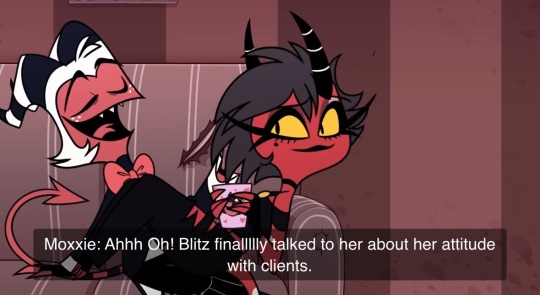
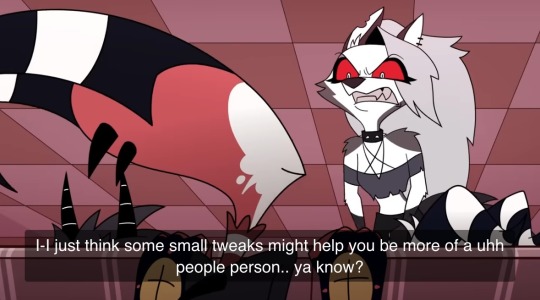
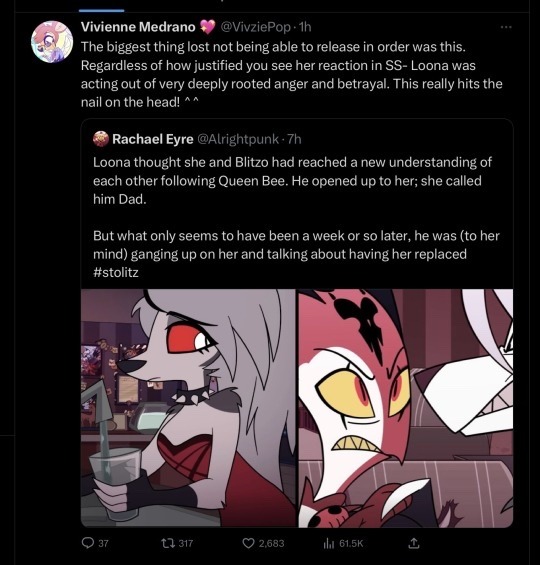
We get to see a bit of Loona’s backstory but secretly it’s mainly to prop up Blitzø. Anyway, Loona looks for Octavia and the two have a shallow conversation talking about fathers along with Loona giving dogshit advice about fathers and how they care/try. Then proceeds to kick her said father figure in the balls. Wow, such a great daughter.
Episode 3, Exes & Oohs: Loona was present in the episode but didn’t do anything worthwhile. Literally was on her phone.
Episode 4, Western Energy: Loona was in the useless B plot, was mute, and we saw her acting like a dog and her being afraid of needles. Nothing worthwhile.
Episode 8, Full Moon: Loona basically says to Blitzø that Stolas is bored of him and talks about red flags (ironic). She was fighting the cherubs with Moxxie and Millie.
Episode 10, Ghostfuckers: Our two undeveloped main characters (Millie and Loona) actually talk to each other and have a moment. (Keep in mind, these two barely interact, last they even spoke to each other was Truth seekers). That’s wild. And offscreen Loona is watching over Moxxie and gives him ice cream on screen at the end of the episode.
Episode 11, Mastermind: Loona goes back to be being a mute for majority of the episode because of the chains. After that whole experience, Loona finally cares about Blitzø.
Episode 12, Sinmas: Loona’s biggest moment is going feral and biting Andrealphus. Luckily for us, Loona isn’t an asshole to Blitzø and we see her irrelevant friends. Also Vikki lives rent free in Loona’s head as she constantly shit talks her.
Loona doesn’t do anything fun or much in season 2. Her biggest moments are attacking Andreaplus and talking to Octavia.
Season 2: Loona is either not physically present, if she is present then Loona is mute for majority of the episode(s), acts like a bitch, and is now positively clinging towards Blitzø out of nowhere when it’s convenient for the plot (whether to farm sympathy points, make the viewer go “aw”, etc).
Vivziepop is wishy-washy about Loona’s characterization throughout season 2.
75 notes
·
View notes
Text
It has come to this: we are now in Ministry of Truth territory. In Washington DC, the Smithsonian Institution, the US’s ensemble of 21 great national museums, last week became the subject of an executive order by President Donald Trump. “Distorted narratives” are to be rooted out. There will be no more of the “corrosive ideology” that has fostered a “sense of national shame”. The institution has, reads the order, “come under the influence of a divisive, race-centered ideology” that portrays “American and Western values as inherently harmful and oppressive”. The vice-president, JD Vance, is, by virtue of his office, on the museum’s board. He is charged by Trump to “prohibit expenditure” on programmes that “divide Americans based on race”. He is to remove “improper ideology”. The order is titled “Restoring Truth and Sanity to American History”. George Orwell lived too soon.
The move is deeply shocking, but predictable. After Trump’s insertion of himself as chair of the John F Kennedy Center and his railing against the supposed wokeness of the national performing arts venue, the federally funded Smithsonian was bound to be next in line. Those who imagined the Kennedy Center was a one-off, attracting the president’s ire for personal reasons, were deluding themselves about the scale of Trump’s ideological ambition. Picked out for opprobrium in the executive order are the Smithsonian American Women’s History Museum for celebrating transgender women (the museum, it should be pointed out, has yet to be built); the National Museum of African American History and Culture; and an exhibition titled The Shape of Power: Stories of Race and American Sculpture at the American Art Museum.
I visited the Museum of African American History for the first time a couple of weeks ago. It is a vast book of a museum, heavy with text. It was full, when I visited, of mostly Black families seeking out an encounter with a narrative that has long been a footnote to, or erased completely from, the main national story. You could spend days absorbing the web of stories that the museum offers, beginning in its basements with the transatlantic slave trade, where one of the most moving objects is, unexpectedly and profoundly, a piece of iron ballast that took the place of a human body after a ship’s cargo of enslaved people had been disgorged on the triangular route between Africa, the Americas and Europe. The whole strikes a fascinating balance between an unflinching gaze on systems of oppression, and a sense of Black achievement and cultural richness that has nevertheless effloresced.
Lonnie Bunch, the founding director of the museum, gave a talk at the House of Lords in 2011 about the institution, which was still in the planning, and would open five years later. I can still recall how moving it was to hear about the difficulties of making a museum – a place where a story is told through objects – from communities traditionally poor in material things. The institution had put out a call for loans and donations. Precious, carefully treasured objects – a bonnet embroidered by someone’s enslaved grandmother, for example – were arriving into the new collection.
Fast forward to the present, and Bunch is in charge of the entire Smithsonian Institution. This is a man who believes, as he told Queen’s University Belfast last year, that history can be used to “understand the tensions that have divided us. And those tensions are really where the learning is where the growth is, where the opportunities to transform are.” That compassionate vision of the past, as a means through which the citizens of the present can better understand each other, is completely opposed to the monolithically triumphalist spirit of Trump’s executive order, in which history is reduced to “our Nation’s unparalleled legacy of advancing liberty, individual rights, and human happiness”. How much easier it is, to sink into this pillowy, comforting notion of glorious progress than to grapple with the kind of knotty, often upsetting and confronting history that the Museum of African American History offers its visitors. But it makes me wonder: can the museum survive this government?
I visited, too, the American Art Museum, whose show The Shape of Power is targeted in the executive order as emblematic of the Smithsonian’s decline into “divisive, race-centered ideology”. The exhibition, which was years in the careful making, points out what is surely obvious, once it has been given a moment’s thought: that race is not an inherent and prepolitical category, but rather a constructed set of ideologies that served (and still serve) a set of economic and political interests. (One way to tell that race is a socially constructed category, in fact, is by looking to the Greeks and the Romans – the people who established, in the minds of many on the US right, “western civilisation”. They were xenophobic in their own way, and enslavement was a fact of their societies. But as is obvious from their literature, whiteness and Blackness were for them simply not operative categories.) The exhibition is an eye- and mind-opening look at how race ideology has translated into and been reinforced, or deconstructed, by sculpture – that peculiarly lifelike and thus “truthful”-seeming artform.
The catalogue quotes Toni Morrison, who once wrote that “I want to draw a map, so to speak, of a critical geography and use that map to open as much space for discovery, intellectual adventure, and close exploration as did the original charting of the New World.” Such intellectual adventuring is not what is wanted by the White House now. Trump’s world is more like Viktor Orbán’s, under whose government the school history curriculum has been rewritten to glorify Hungary, or Recep Tayyip Erdoğan’s Turkey, where the novelist Elif Shafak, as she recalled in a Guardian Live event last week, was prosecuted for “insulting Turkishness”, her lawyer obliged to defend in court the views of her fictional characters. The Smithsonian and all who work there have an unenviable choice, one that has already been put before other great or formerly great institutions such as Columbia University: to comply with Trump’s dark demands; or to find ways to defy them.
37 notes
·
View notes
Text
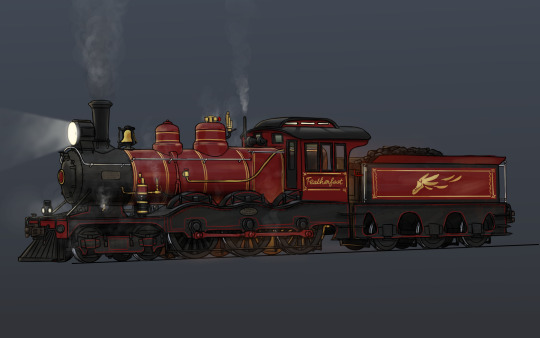
Commission for @pikablob of the steam locomotive Featherfoot from her Underrail fantasy setting (which can be found here)
Finally, on the nearest occupied track, close enough that she could hear some component within chunking back and forth with quiet mechanical regularity, was an engine painted in brilliant scarlet. Its boiler seemed to be in the dominant Freehold-style, with a tall funnel, two great domes, and exposed pipework, backing into a large cab topped with a little clerestory bump; but its wheels and mechanics were mostly hidden by heavy frame-plates, save for exposed cranks between the three driving axles.
Featherfoot is sapient, with a "Coal Heart" in her firebox which acts as the mind and main power source for the loco (though she still consumes coal). She is a one-off 4-6-0 Constitution-type built by E. Towan & Co. Jushi Works, using a boiler built by Cortopassi Locomotive Works.
More background and alternate image versions below the cut:
Featherfoot is based on a Illinois Central Railroad ten wheeler of the type that was involved in Casey Jones' infamous train collision, but below the frames it more resembles an outside-frame inside-cylinder Great Western Railway 4-4-0--a City or a Duke class. Its tender is based on a GNR tender similar to what the Stirling Single carried.
There are four holders for marker lamps or flags--three along the pilot beam and one on the smokebox, intended to be used with UK-style headcodes but with US-style marker lamps.
The livery is based on the fictionalized GWR Duke class seen in Assasin's Creed Syndicate.
Here's some WIP images: 1:25 PM to 2:37 PM
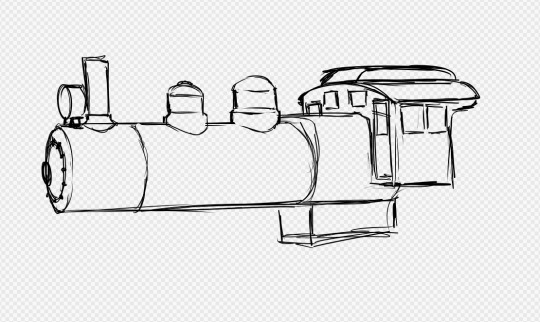

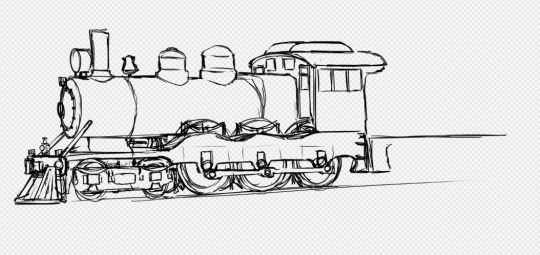
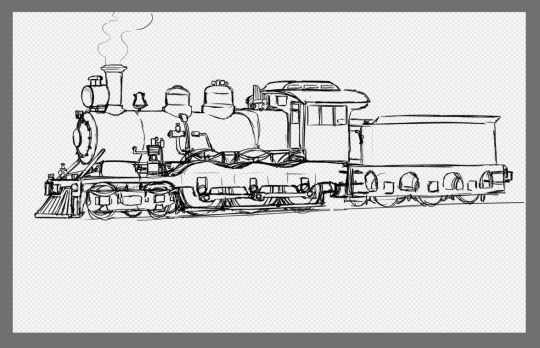
While waiting for the client to get back to me on some questions, I doodled this:
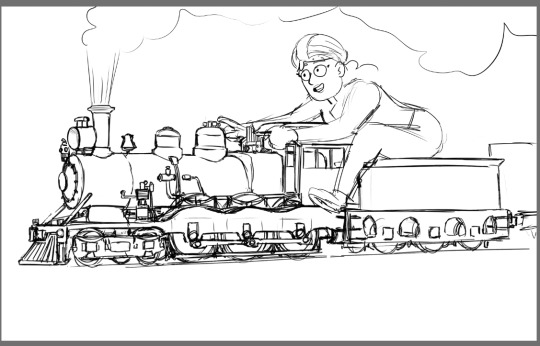
Eaurp Guz! What are you doing on a miniaturized fantasy train!? Ah who am I kidding this is super in-character for her.
After a break and a little back and forth with the client (moved and replaced the whistle, replaced the oil headlamp with an electric one, added a dynamo), I completed the sketch.
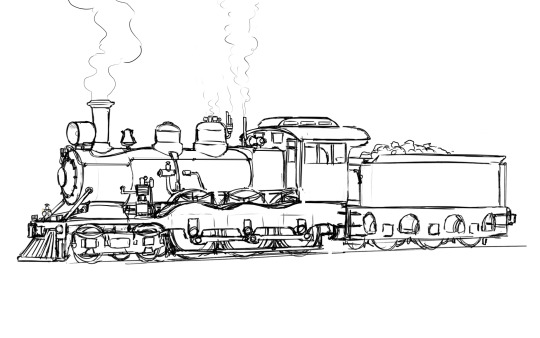
I also tweaked some of the proportions a little. Note that when I am doing a "sketch" commission as opposed to "clean line art" i usually clean the sketch up a little more than I did here.
I then moved on to line art, which also gave me a chance to get the proportions on the wheels and frames right. I also totally re-thought the appliances and piping visible on the boiler.
By 10:31, the line art was complete. It had taken about an hour and thirty minutes, i don't have an exact timestamp.

Various other details were also added here--rivets, brake pipe, detailed coupler, detailed air compressor, snifters, wheel spokes, cut levers, the two builder's plates.
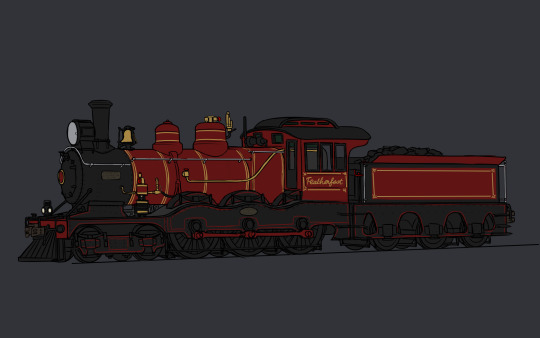
Here's the loco with full color. This is more or less how I left the loco off at the end of last night, at around 11:30 PM.
This morning at about 10:30 AM, I started working on rendering--and at 12:30 PM I finished the drawing.
The rest of these alt. versions are not chronological, and were created by removing certain layers:

The engine, cold.
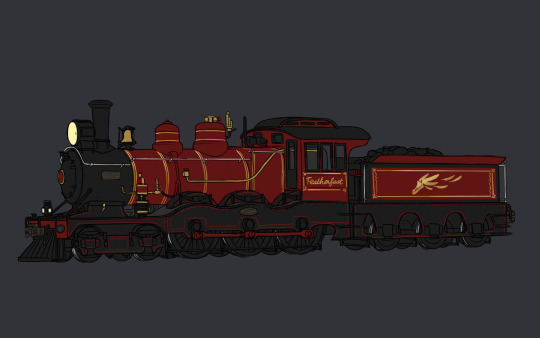
The engine, solid color (but finished).

Solid color, but brightened to look better in a white background.
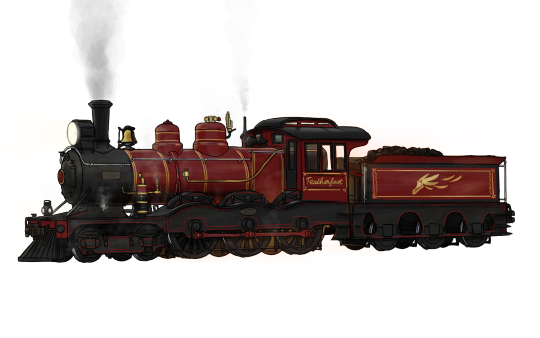

Transparent version with and without full rendering, steam, and lights.
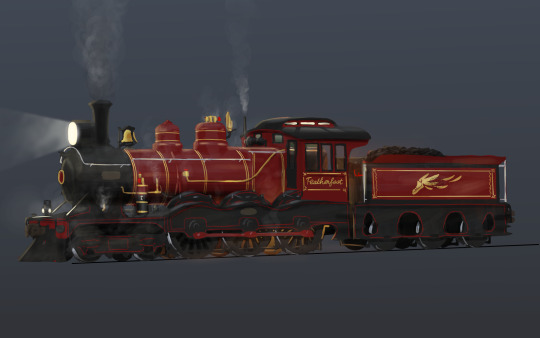
I was shocked to find that with the line art removed, it didn't look half bad. It does look way messier, but I really need to go and try to tackle a fully lineless drawing in this style some time.
#Underrail#Featherfoot#Fantasy train#fantasy art#D&D art#train#steam train#steam engine#steam locomotive#locomotive#commission#art#digital art#digital painting#painting#underground#red train#steampunk#railway#railroad#original character art#oc art
44 notes
·
View notes
Photo

What Were the Consequences of WWII?
The consequences of the Second World War (1939-45) were many and varied. Nazi Germany, Fascist Italy, and military-dominated Japan were all defeated. Many occupied countries were liberated and regained their freedom while others were obliged to bear overrule by the USSR or the United States. The old world order was turned upside down as empires fell and former colonies won independence. Victory had cost 60 million lives and caused millions more casualties. Still more millions had escaped death or injury but were made homeless or refugees. Never before had a war affected so many people in so many places in so many ways.
Hiroshima after the Atomic Bomb Attack
Imperial War Museums (CC BY-NC-SA)
The main consequences of WWII were:
The aggressive Axis dictatorships of Germany, Italy, and Japan were defeated
60 million deaths
The Holocaust, which resulted in the death of 6 million European Jews
Millions of wounded, homeless, and displaced people
Europe was divided into democratic Western Europe and Communist Eastern Europe
Germany was divided into two separate countries, and Berlin was divided into zones ruled by various powers
Japan was occupied by forces of the USA
Britain, France, and other European states lost their grip on their colonial empires
The United States and the USSR were established as two superpowers who could dominate global politics
The USA and the USSR were mutually suspicious of each other's intentions, and so the Cold War developed
The use of the atomic bomb on Japan made everyone fear a coming nuclear war
Western European states were determined to form closer economic and eventually political ties that would help prevent another war in Europe
There was a desire to create internationally applicable laws, such as those regarding war crimes and genocide, and rules that could help settle territorial disputes peacefully
There was a desire to foster global cooperation in the areas of trade, health, and education through the creation of the United Nations
There were social changes, such as in eating habits, fashion, and an increase in the rights and opportunities for women
Technological innovations like the jet engine, radar, and general purpose computers
Death & Destruction
According to the Imperial War Museum, the Second World War caused around 60 million deaths. This compares to 11 million in the First World War (1914-18). The exact numbers will never be known, such was the scale of the carnage, which involved 56 combatant nations. The Holocaust killed an estimated 6 million Jews in death camps like Auschwitz, labour camps, and through the actions of the Einsatzgruppen mobile killing squads. Other specific groups targeted in territories controlled by Nazi Germany included Romani people, Jehovah's Witnesses, and Communists, to name just three from a very long list.
Civilians accounted for perhaps half of the 60 million deaths. A great number of civilians died in their homes as a result of indiscriminate bombing campaigns carried out by all sides. Many more men died than women in the war, and so the sex ratio of some populations was altered dramatically, with a consequent, albeit relatively short-term effect on fertility rates.
Attacking Omaha Beach
Robert F. Sargent (Public Domain)
Figures for the wounded and injured are even more difficult to determine. There were, too, different types of casualties since many who had participated in or witnessed combat, bombings, and atrocities found it difficult to overcome the mental trauma of such experiences. For many soldiers, reintegrating into society proved far from easy.
During the war, millions of civilians had fled areas where there was front line fighting, while millions more people were forcibly moved by governments. Jewish people, in particular, escaped persecution when they were still able to, which led to tens of thousands moving to countries like the United States, Argentina, and South Africa, to name only the top three destinations. In short, "the dislocating effects of the 1939-45 war had repercussions on the ethnic and nationalities mix in many regions, storing up explosive material for conflicts still unresolved today" (Dear, 227). Such upheavals have also made accurate statistical analysis difficult.
Many cities and towns suffered tremendous physical damage to buildings and infrastructures. Bomb-damaged buildings remained a familiar sight in many places right through the 1950s. Transport and communication networks that connected those towns also had to be rebuilt. Millions of children had lost their parents. Health systems were put under tremendous strain. Epidemics of infectious diseases broke out because of breakdowns in sanitation systems. Food and essential items like clothing were rationed in many countries during the war, and this situation continued for many years. In Britain, for example, rationing of clothing continued until 1949, while meat was rationed until 1954.
Recruitment Poster for Women, WWII
Imperial War Museums (CC BY-NC-SA)
Continue reading...
38 notes
·
View notes
Video
'Vacs' on tour by CJ Rich Via Flickr: 50007 'Hercules' and 50049 'Defiance' power through theirold stomping ground of Maidenhead on the Great Western on 29 July 2023 with 1Z50 Ipswich - Paignton
#Vacs#Hoovers#Class 50#50007#50049#1Z50#GBRf#GB Railfreight#Maidenhead#Sir Nicholas Winton#GWML#Great Western Main Line#flickr
10 notes
·
View notes
Text
I'm your Little Baby Doll, you're My Mr. Rock n' Roll
Cliff Booth x Actress! Reader
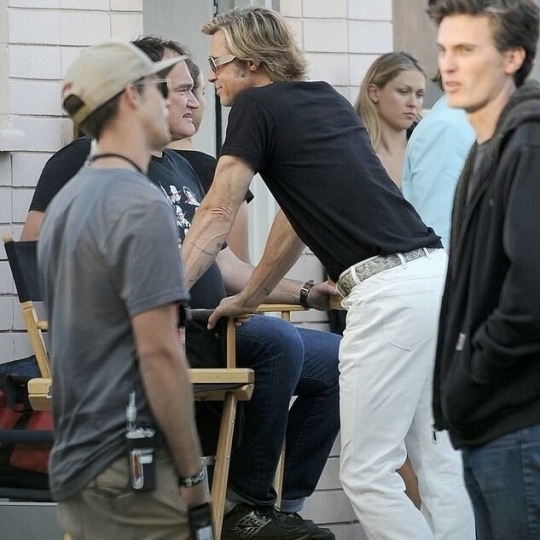
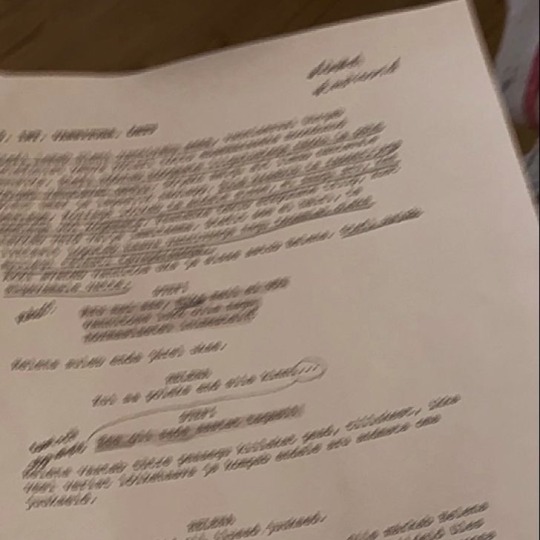
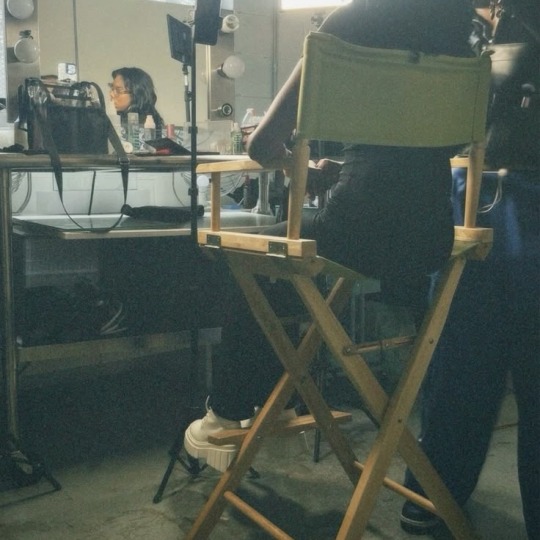
Summary : You meet Cliff Booth again, but someone is determined to keep you apart.
A/N : I'm back again with more Cliff content. I just finished my rewatch of OUATIH for the story and gosh is that a great film. Once again, this chapter was written while listening to unreleased Lana.
Warning : Language, Talks of Death (Murder)
Word Count : 3.1k
Chapter Index : I, II, III, IIII
Click Here for Ao3 Ver.
You were still a teenager when you moved to Hollywood. With not much to your name, you struggled to make end's meet. You had worked as a waitress, and it was there you'd met your talent agent, Frances Adams. You don't remember how your conversation had shifted from what kind of eggs she'd like that morning to your aspirations of becoming an actress. But in the end, she wasted no time making you sign a contract, binding your careers together for the next decade or so. You still didn't know if Frances had any true experience in business or managing.
In your two years of working together, she went from getting you to act in commercials to you starring in your own movies. You didn't have a clue how she'd done it, but you were grateful for what she'd done, as you knew not everyone in your position had these kinds of opportunities.
On your schedule today, an interview and an audition. You'd looked at the limited script you had been given the day before. A short western series, Coyote's Gambit, where you, if casted, would play the part of the main romantic interest. A sarcastic and confident woman with a vulnerable side named Margaret. You were happy to have been considered in something that wasn't a comedy. Not that you hadn't enjoyed making those pictures, simply you wanted to try something different, more challenging for you.
You arrived at the studio a little after nine. It was a hot day beneath the Californian sun. You'd opted to wear a dress considering the heat and the fact you had an interview that morning. You walked to the costume trailer, which was, luckily for you, not too far from the parking lot. The makeup artists had set up their stations outside considering the limited ventilation in the trailers. You greeted them all quickly as one of them motioned for you to sit down on a chair so she could get started.
You took a seat and closed your eyes as she began applying eyeshadow. After only fifteen minutes she was done. She handed you a mirror as she moved on to her next client. You admired her work. Your eyelids were painted a light blue with a sharp line of winged eyeliner and a thick coat of mascara on your lashes. It was a popular look and you thought fitted you well after all the monochrome makeup from Cottontail Bandit you'd been used to these past few months.
You heard the sound of someone walking towards you. You removed the mirror from your eyesight to see who it was. In front of you stood a man in a black shirt and white pants, sunglasses covering his eyes.
"Mr. Booth, what are you doing here today ?" You asked with a slight smirk as you crossed your legs and laid back further in your chair.
"Driving around my boss, it's all I do these days." He huffed as he put a hand on the armrest of your chair. You had to stop yourself from looking down at his bicep. "What do they got you lookin' all pretty for ?"
"An interview and later an audition." He hummed.
"I think this is the first time I've seen you in regular clothes." He joked as he pulled his sunglasses further down his nose, exposing his eyes. "Not that I was complainin'."
You giggled. "Yep, the bunny suit is retired. Should've enjoyed it while it was still here."
"Oh, I sure did, sweetheart." He said as he leaned in closer to you. "Though-"
Whatever he was about to say was interrupted by a screeching voice. "Clifford Booth get the fuck away from my actress !" Frances.
He got off your chair. "Miss Adams, how are you doing on this fine day ?" Cliff said, his tone obviously trying to annoy her.
They knew each other. How ? That you didn't know.
"Better once you fuck off." Your manager answered, her voice full of spite. "What the hell do you think you're doing ?"
"I'm just having a nice chat with Miss L/N about her last film. That playboy one. Am I in trouble ?" He kept his cool, finding amusement in all this almost.
"You leave her alone or I'll have her get a restraining order against you." Frances said, dead serious. You'd never seen her this mad before, you were almost too afraid to say anything.
Cliff gave her a dry laugh as he slowly walked away. "See you around, darlin'." He said looking straight at you, dismissing Frances fully.
"You better fucking not !" She shouted as Cliff disappeared from view.
"Fran, what's the problem ? We were just talki-"
"He was the one you were with outside yesterday." She stated plainly.
"Yes ?" You said, not understanding how this was such a grave offence. "He was waiting for Rick Dalton. It was a coincidence. He's just being nice to-" You were cut off once again.
"You steer away from him. He's no good."
"Why ? What's your problem with him ?"
"That prick killed his wife." She dropped the bomb.
"What ?"
"Everyone knows it. A 'boating accident' they said. Unless you want to be the next one six feet under, you don't even look at him." She ordered you with complete seriousness.
As it turns out, you were one of the few people in Hollywood not aware of who Cliff Booth really was. After asking Frances for some more details, she explained that on that fateful day he'd gone on a boat ride with his wife, Billie, and when they came back she had been stabbed trough the stomach by a harpoon. Gruesome indeed. The thought made you shiver, had you been cozying up to a murderer ? Even if your two interactions had been brief, he'd left his mark on you. He'd partially occupied your mind since your last talk the evening prior.
You sighed as Frances lead you to a designated spot outside for your interview. You shook hands with your interviewer, Dean Farrow and sat down on the actor's chair in front of him. As he introduced you to the camera, you spotted far behind him Rick Dalton walking into a building, followed obviously by his stuntman. The door was opened for them by a security guard. Rick seemed to be talking to himself, rehearsing line probably, and Cliff looked as unbothered as ever.
"So Miss L/N, how does it feel to finally have broken into the world of cinema ?" Farrow asked with that fake news reposter kindness.
You quickly composed yourself and began answering his question. "It's been such a rewarding feeling after all the hard work I put into my career. I mean just a few years ago I was serving tables at a bad restaurant." You laughed.
"Talking about waitressing, how do you feel about the controversial nature of your character's profession ?"
"I think she's trying to live the best life she can with the cards she was dealt. I mean, I don't want to reveal what happens in the movie, but she uses the only tool she feels she has to her advantage. But this is a comedy, I hope people don't take it too seriously."
"Yes, it seems like audiences are divided on their opinions regarding the film. On one hand the younger crowds seem to think this movie will be an empowering tale, on the other, less open viewers believe this could affect the youth into rushing to sign up for jobs at the Playboy mansion."
"All I have to say about the topic is that this is a film, we don't want to encourage anyone to do anything. I think viewers need to keep in mind this is a very romanticized version of that culture, we do not see all the struggles my character probably goes through. At the same time, I do not think we should be mocking anyone's who's chosen that line of work."
After a handful of questions, Farrow ended his segment by telling viewers the release date of the film. The camera turned towards you once last time, you blew a kiss at the audience and waved them goodbye. The cameraman yelled cut and all the tension you hadn't realize you'd built up faded away. You thanked the two men and before they could say anything else, Frances was already back at your side. She excused you as she shoved a script in your hands.
It was the script for Coyote's Gambit. She gave you a look as if saying 'no time to waste'. You knew the interview had lasted longer than planned, but you doubted you needed to be rushing this much. She brought you towards the building your audition would be taking place in. Your eyes were glued to the words you were reading on the pages, not paying much attention to where the older woman was bringing you.
It was only when a man spoke that you looked up. "I'm sorry, only the actors are allowed in." That was the security guard you'd seen at the start of your interview. You looked up at the building in front of you and you realized it was that same building Cliff had walked into following his boss.
As you heard Frances argue with the poor man, you intervened. "It's alright Fran. I can take care of myself."
She scoffed, doubting the last part. The security guard opened the door for you and closed it quickly before your manager could try running after you.
The inside of the studio had been divided into two sections, the waiting room and the audition room. Strangely enough, you were the only person in the waiting room.
A man walked out from the other area to greet you. He had disheveled brown hair, a long bead and big glasses. "Y/N L/N ?" He called.
"That's me." You said as you walked towards him.
He approached you and shook your hand excitedly. "Maxwell Blythe. I'm the director and writer of the show."
"It's great to meet you sir." You said with a smile as he lead you into the next room.
"Please call me Max." As you feared, you were faced with Cliff Booth once more. You saw his face shift from bored to amused. Rick Dalton was sitting next to him, smoking a cigarette while whispering his lines.
Max brought you closer to the two men. "I presume you know Rick Dalton ? He's going to be playing the series lead, Jack 'Coyote' Steele."
"Of course. It's an honour Mr. Dalton." Rick gave you a simple smile.
"And this is his stunt double, Cliff Booth."
"A pleasure ma'am." Cliff said as he shook your hand with both his larger hands, pretending not to know you. He had a huge smirk on his face. You just gave him a polite nod.
After a lot of introductions, you were finally asked to stand in the middle of the room and play out the scene with your possible costar.
"And action." Someone shouted.
"Back again, Mr. Steele ? How long do you plan to stay in town this time ?" You started, your character's tone playful.
Rick paused before saying his line. "Until the authorities come lookin' for me Maggie."
"Well, I sure hope you haven't forgotten all about us while you were out in the big city."
Rick stayed silent. Meanwhile your character's strong shield was slowly being lowered to show her soft side.
"You can't run forever." You said as you got closer to the actor, getting more and more serious as the scene progressed. "They'll know you're here. It's dangerous."
"I can't leave. Not this time."
"Why not ?" You recited as you felt the tears pooling in your eyes on command.
"I've got somethin' to stay for."
"It's not worth it Jack, you're wanted. Dead or alive."
"Then leave with me. We can live from town to town, they'll never find me." Rick grabbed your upper arms to show the desperation of the coyote.
"But what if they do ?"
"I won't let 'em."
"Cut !" The director shouted. "That was great Y/N." You lowered your head as a 'thank you' as you wiped the water from your eyes.
You turned to look at Cliff who was leaning on the wall. His eyes were fixed on you, but he kept quiet.
"You're hired !" Max said suddenly. It was unusual to be hired on audition day, even you knew that.
"Mr. Blythe, you can't just hir-" An intern tried speaking but was stopped by the artist.
"The studio gave me full creative liberties. If I want to hire an actress on the spot, I will. No matter how late she showed up."
As the executives discussed, you decided to approach Cliff, against your better judgement considering the news you'd just gotten about him.
"Anyone tell you you're a pretty good at this ? Maybe you should become an actress."
"Never." You said with fake-shock, but you were unusually neutral.
Cliff could tell something was different. "What's up ?" He asked bluntly.
You hesitated for a moment but decided to be honest. "Listen, after her outburst, Frances told me some pretty nasty stuff about you."
He sighed, knowing exactly what the talent agent had done. "It ain't true." He answered plainly.
"Uh huh ?" You looked up at him, unable to say anything.
"She fell. The coroner said so himself after lookin' at the wound. There's no way I, or anyone else, could've done that to her. Can't argue with the law." His tone was the most serious you'd ever heard it. "You know how fast rumours spread here."
He looked down to make direct eye-contact with you, trying to reassure you.
Something in you was telling you he was being truthful. He was right, rumours spread easily and get disproportionate in Hollywood. But then again, if he was guilty, you'd doubt he'd admit to it. You decided not to think with your brain for now and just hoped you wouldn't be the next one found stabbed.
"Franny's never liked me."
"So you know each other ?" You leaned your shoulder against the wall, facing him.
"Well, I presume you know about your manager's failed acting career ?" His demeanour went back to its usual cheerfulness. "Back in the day, maybe 15 or 20 years ago, when you were just a baby, I accidentally fell on her during a stunt." You dismissed his comment about your age and focused on the story he was telling.
He could tell from your expression that you were holding in a laugh. "Tell me about it."
"We were filming this time-period drama. Fancy suits and what not. Anyways, I was supposed to jump off this two story building, but I somehow missed the safety net at the bottom and landed right on an extra. Just so happened to be your dear Frances. She wasn't hurt or anything, but you know her, she holds grudges."
"God, knowing her she probably blames you for ruining her career." You joked.
"Well, if that's the case, I'm glad I missed the stunt that day. You wouldn't be here otherwise. Could almost say I'm the cause of your success."
"And I'm so forever grateful Cliff." You said as you comically batted your eyelashes.
He noticed the way you'd finally called him by his first name. "It's no problem, darlin'."
Your conversation stopped once Maxwell stood in the middle of the room and announced that you would all start shooting in two days. You could see the executives behind him, disapproving and scrambling to find a way to make this work. You knew this was going to be a crazy experience. The director dismissed everyone and as you made your way towards the exit you could hear him arguing with producers.
Cliff and Rick followed after you. As you reached the entrance, Cliff extended his arm to push the door open, all while staying behind you, getting quite close to your back in the process.
After only a few steps on the pavement, Frances came running back to you. But her attention was on the man accompanying you.
"What the hell do you think you're doing ?" Your manager asked, her tone frustrated.
"Working." Cliff answered, not even bothering to look at her as he placed his sunglasses back on his face.
"I'll be in the car." Dalton muttered to his friend as he placed a cigarette between his lips and quickly left.
Frances looked to you for an explanation. She was practically red.
"Rick Dalton is the lead for Coyote's Gambit, so he and Cliff were at the audition."
"Cliff ? You're on first name basis with that idiot ?"
"Well, we're gonna be working together for a few weeks, so get used to it." Cliff said to the woman.
She slightly calmed down, understanding that you had managed to land the role. "Oh, thank God." She huffed as she looked up at the sky. "My hard work is paying off."
You didn't comment on her last words, she was starting to get on your nerves.
"Listen, Fran, I can surround myself with who I want." You said, bringing up your previous topic of conversation.
"No, Y/N, you can't. You've got to understand that surrounding yourself with certain people is career suicide."
"Thanks." Cliff said sarcastically.
"But-"
"Our contract states I can make these kinds of decisions for you, so I better not see you two chattering again or I will sue." Frances said, dead serious. She didn't let either of you answer back as she tightly grabbed your wrist to bring you far away from the stuntman.
Frances had a way of over exaggerating things. Although it is possible to sue someone for breach of contract, you refused to believe she would take you to court for talking to a man. She didn't have the money and if she ruined your career by sending you to trial, she'd kill her cash cow.
You looked back at Cliff. He gave you a 'eh, what can you do' look, regarding Frances' bad temper. He gave you a wink as he turned around to leave.
You wondered if being around Cliff Booth was as much trouble as your agent made it out to be. Cliff was not blacklisted from Hollywood, he hadn't been sent to prison and people did not seem to act different around him from what you'd personally seen. You didn't want to stay away from him, and if you needed to lie to the woman who'd built your career, you would do so without a problem.
The next two days could not pass fast enough. The old far west was the next place where you'd see Cliff Booth.
#fanfic#fanfiction#cliff booth#once upon a time in hollywood#brad pitt#cliff booth x reader#x reader#quentin tarantino#x fem!reader#1960s#ouatih
35 notes
·
View notes
Text
FAQ Addendum: On Canon & Wild Life vs. the Life Series !
These two questions are quite similar in nature, so we wanted to answer both of them together.

Great question! For DEADEYE we are totally open to both kinds of pitches, ones that manicure canon into a western and ones that are trying to craft something new out of canon. What we're trying to explore with our dual themes is mood, atmosphere; the sights and sounds of deserts and chaparral and mountains and plains, the smell of gunpowder and leather and dust and a cool breeze, the energy of the open road and the feeling of the unfettered night sky. That core is more of a priority to us, and we're looking to let our contributors explore whatever aspect of the western themes really inspires them.

For this question, it's a pretty similar answer. DEADEYE has a focus on Wild Life, but it's by no means a hard line. Grudges, relationships, these things carry over through the series even when the players are explicitly trying to shirk them. We're open to pitches that are maybe less relevant to Wild Life and slightly more relevant to another series, or the series as a whole. The main thing that we're concerned with preserving is the core western theme, rather than making sure things stay within the canon events and relationships of Wild Life, so we are - as always - willing to work with your pitches to find something that has cohesion.
19 notes
·
View notes
Text
There's "spaghetti western" and then there's whatever the hell this Chef Boyardee shit is
Hello! and welcome back to Wifelink. We're talking about Outlaws of Thunder Junction today, Magic's second product in a row set in a version of Nevada, and let me tell you something: I am not impressed. The mechanics are uninspired, the setting is undercooked, the story is overstuffed, and to top it all off the whole thing smacks of settler-colonialism. AND they yassified Vraska, the monsters!
WE WILL GET TO THE HOT WOMEN, BELIEVE YOU ME, BUT FIRST I AM GOING TO COMPLAIN SOMEWHAT, AS IS MY RIGHT AS AN AMERICAN, AS A HUMAN BEING, AND AS A GAMER
The mechanics we've discussed elsewhere, and I will skim over the main storyline except to say that very few of this Big Villain Heist Team-Up gets enough spotlight to justify their inclusion here beyond getting recognizable names on cards, and that Rakdos' presence on the plane alone ought to be an apocalyptic calamity. I appreciate Jace & Vraska going full blackpilled accelerationist, stealing a baby, and aiming to destroy the multiverse & start over (a novel hybrid of Raising Arizona and Doctor Strangelove,) but I also know, sure as the sun rises, that whatever happens with their villain arc will be a underwhelming let-down.
What I actually want to complain about, though, is the setting. Thunder Junction ain't real, and I don't mean it's fictional, I mean it's plywood facades on a backlot. It's the set for a cowboy film. You feel me? This ain't a plane, it's a god damned sound stage.
Lemme go over the facts: we know Thunder Junction has been settled for a bit over a year. A year! - and yet there's multiple towns, multiple railways, and an honest-to-god metropolis. Less than two years and we already have ghost towns! This is not the product of a bunch of people on various planes all individually deciding to seek a new life in the off-world colonies. All of this represents a staggering quantity of people, material, wealth, and labor, being moved between planes, directed and organized - but by whom? For what reason? How, even? The story is totally uninterested in these questions.
One of the few silver linings to the way the Phyrexian invasion storyline ended was that the Omenpaths had a lot of interesting potential! Different planes would come into direct contact with each other for the first time ever! Different technologies, different philosophies and religions, different kinds of magic colliding, coming into conflict, adapting and adjusting to each other. And after a couple of sets where the interplanar contact was limited to one or two particularly adventurous individuals, we finally get to see what interplanar contact at scale looks like here in Thunder Junction... and it just looks like a John Wayne flick. Did people not bring their culture with them? Is there a big rack of hats and boots and dusters right where people step off the Omenpath? Shuck off those old Ravnican rags, kid, get changed. You'll spoil the aesthetic. I mean, it's baffling.
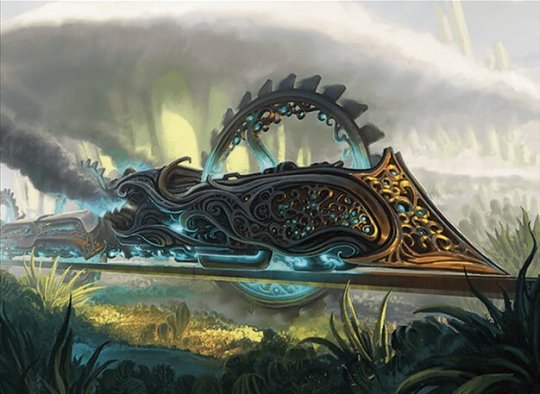
Luxurious Locomotive (art by Leon Tukker). This is one of the few man-made parts of this plane that I can look at and know where it came from: this is a Kaladeshi design. More of this sort of thing would have made Thunder Junction feel more like a real place and less like a Sergio Leone joint.
There's a side story, No Tells, by Isaac Fellman, which I quite like actually: it's about guilt and betrayal and the inevitable regrets of having moved into a queer housing co-op, and one of the things that makes it great is that we know where Yuma came from (New Capenna), we know why he left (the limitations of "be gay do crimes" as praxis under capitalism), and we know what he brought to Thunder Junction with him (cocktails, pool tables, and his co-op's emergency funds). Fellman has written nothing else for Wizards and doesn't play Magic, and even so he's done more to make Thunder Junction feel like a real place situated in a real history than the rest of the story team combined - which goes to show, one, that we should only let trans people write magic story for the next decade or so, and two, that what I'm asking for in terms of worldbuilding is not unattainable, or even that difficult.
And all of this ties into the colonialism, right? Thunder Junction is being colonized, and asking questions about who benefits, who's sponsoring this breakneck settlement of the plane, what they're after and so forth would require the story to take a good hard look at the process of colonization itself, and Wizards is flatly unwilling to engage with anything that thorny in their products. So, just as Ixalan involved a limp-wristed slant reenactment of the Spanish conquest of the Americas - but it's fine because they're the bad guys and they're technically not even trying to colonize Ixalan and they don't win anyway so no one gets hurt! - Thunder Junction is attempting to present a Disneyland version of Western colonialism. Untamed wilderness! Bringing civilization to uninhabited deserts! How cool and heroic these hard frontiersmen and -women are! I'm told they brought in Navajo cultural consultants for the Atiin, a fantasy equivalent, and I hope those folks were well compensated! The Atiin seem cool, and the one Atiin character we spend any time with is well-written, but the Atiin are not indigenous to Thunder Junction. They're not being colonized. And if there weren't anybody being colonized, I'd probably still dislike the colonial vision of a wild land inhabited only by animals, just waiting for us to shape it to our will with railways and violence, but there is in fact a native race of sapients on Thunder Junction, and these cactus folk get no voice in the story, so if they have some kind of opinion on the rapid colonization of their home and the clear-cutting of their cactus forests, we don't get to hear about it.
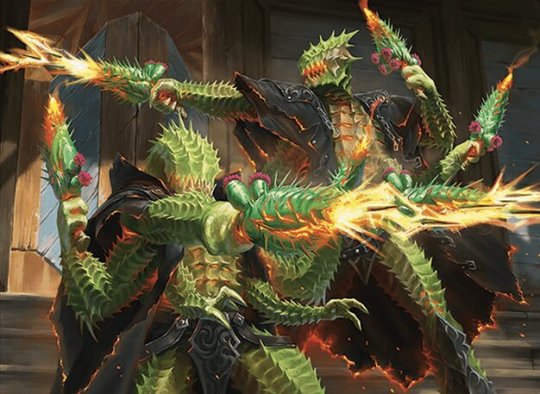
Prickly Pair (art by Brian Valeza) Too much of the extremely-limited presence Thunder Junction's only indigenous sapients have on the cards is devoted to cactus-based puns like this one, which is pretty distasteful given, you know, the colonialism.
I'm talking about colonialism not because I think that replicating colonial myths in fantasy fiction is an unethical thing to do - although it is - but because you can see, right, that Thunder Junction's lack of verisimilitude is intertwined with the colonial vision of the world at play here, yeah? The story wants to have cool cowboy shootouts and train robberies and it does not want its cowboy fantasy to be complicated by uncomfortable realities, so it has to avoid all of the basic worldbuilding questions that would tell us who the colonization benefits and how they're profiting off the plane, and in the end we're left with nothing but an empty aesthetic, like a duster hanging off a scarecrow, blowing in the wind.
ANYWAY SO WOMEN
To be honest, under the circumstances I'm not really feeling like giving the fine women of Thunder Junction my usual more elaborate treatment, so we're going to lightning-round this shit, which is at least thematic.
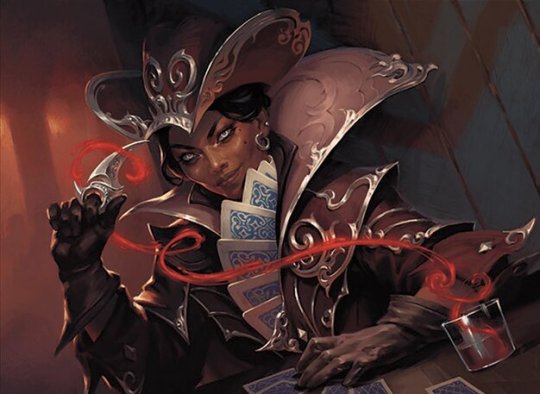
Blood Hustler (art by Anna Pavleeva)
Vampire MILF.
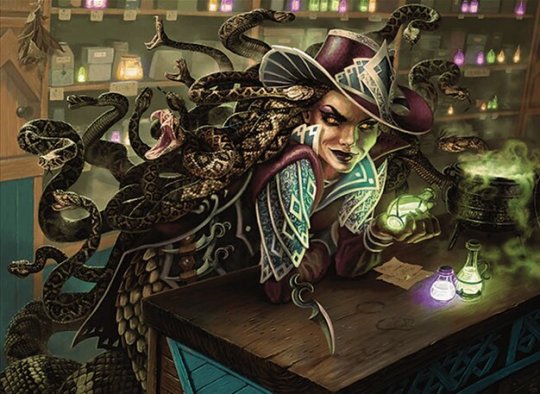
Rattleback Apothecary (art by Loïc Canavaggia)
Snake MILF.
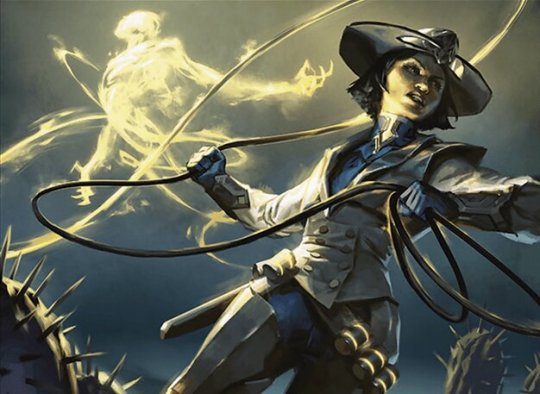
Wrangler of the Damned (art by Michal Ivan)
Cis lesbian haircut, good with a rope.
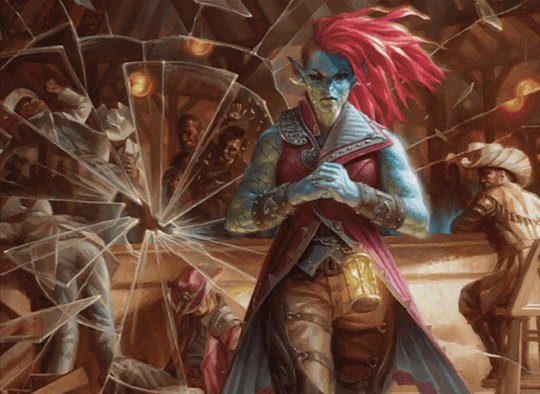
Obeka, Splitter of Seconds (art by Ryan Pancoast)
BIG
85 notes
·
View notes
Text
A Gaylor/Kaylor Interpretation of "But Daddy I Love Him", Despite It Being Obvious, 'Cause Happy Pride

Overblown Analysis Under the Cut ↓
"I forget how the West was won // I forget if this was ever fun // I just learned these people only raise you // To cage you"
The opening line is a reference to a film called How the West Was Won (1962). I'm not well-versed in this film, but I know that older American Western films and the American cowboy aesthetic in general often represent male masculinity, and by extension, male heterosexuality, romanticized into picture-esque imagery of wealthy, cis, white, straight manly men ruling the West through violence. All this despite the fact that historically, many cowboys (not just boys/men, of course, so cow-folk maybe, if that's even a term) were broke queer people, often people of color, trying to survive. Similarly to Taylor, these individuals have had their queer history erased all for the sake of marketability and giving a general audience a more traditionally palatable and relatable portrayal of reality to consume. (For more on this topic, Kaz Rowe has two great videos on queer cowboy history and the queerness of cowboy movies, if that interests you.)
With "how the West was won" not being capitalized like a film title, it seems clear that while she's referencing the movie, she's not directly talking about How the West Was Won (1962). I think this line might hark back to "Cowboy Like Me", a song about Taylor (and her lover) swindling the public into assuming they're straight and the industry "rich folks" into thinking they'll abide by their rules forever. If she continues to beard and swindle she'll win the hearts of the general public more and more, or the hetero "west", but she forgets what the benefits of doing that at the unknowing cost of her happiness were. From my perspective, if Taylor forgets how the West was won, she's saying she forgets what the long-term value of hiding her queerness with straight narratives and beardings had in her mind once upon a time. She forgets if she ever found the beardings/stunts fun in her youth because she has now learned that "these people", likely industry people who have had hands in her career, only closeted her for their own money benefits, not truly caring about her at all.
"Sarahs and Hannahs in their Sunday best // Clutchin' their pearls, sighing, "What a mess" // I just learned these people try and save you // 'Cause they hate you."
I think many songs or moments in TTPD are Taylor envisioning/anticipating what could happen if she were to come out. Obviously, the main source of bigotry against queer people is warped religious beliefs, so the "Sarahs and Hannahs in their Sunday best" are homophobes in this reading, but considering Taylor's fanbase and the feminine names chosen, they could very specifically be swifties who are overprotective of Taylor. Swifties who do deplorable things in the name of protecting Taylor's honor, such as doxxing gaylors online because they disagree with them and see suggesting Taylor's queerness as immoral. These types of swifties will often call the act of speculation on Taylor's queerness "gross" and lean on the reasoning for that being that speculation is invasive, even though Taylor herself has never commented against speculation of her queerness in any way when she very well could if it bothered her. Therefore they have no actual clue if that's how Taylor sees it, it's just their homophobic opinion that the suggestion of queerness is gross and they project the opinion onto Taylor as if anti-speculation should be universal when it's not nearly that simple. They see the act of the Taylor sexuality discourse existing as a mess.
If Taylor is queer, seeing that a number of her fans find queerness disgusting would produce incredibly negative feelings, whether it's anger or sadness. While I don't think every anti-speculation swiftie has these particular feelings towards it (it's complicated and could have a post of it's own), some hetlors hate speculation because they know that it could be correct. If Taylor were out as queer she'd become a "queer thing" they couldn't enjoy the same way anymore; she wouldn't be their mirrorball anymore, and that's terrifying because for many that's Taylor's appeal. If she's queer she's no longer this bestie, big sister, twin from your dreams type of artist to hetlors, she's this "other" that belongs to "others". This subsection of fans try to defend her because they, consciously or not, hate the idea that an assumed "straight" woman could actually be queer and unlike them. And therefore they indirectly hate her. The real her. They'd rather have the brand Taylor Swift because they can relate to it more, so they don't want to see her. "You needed me, but you needed drugs more" (from "COSOSOM"). They try to "save" her from being seen/out 'cause they hate her.
"Too high a horse // For a simple girl // To rise above it // They slammed the door // On my whole world // The one thing I wanted."
Both the "Sarahs and Hannahs" and "Elders" exhibit a sense of superiority Taylor feels like she can't rise above by being simple. Many anti-speculation people see their opinion as the politically correct thing to do. Therefore it's superior to speculation in their eyes, despite the fact that speculation can be a critical step to finding other queers and even can be used as a form of coming out—letting people speculate. They're on "too high a horse". The attempted Lover coming out was very simple, with Taylor flagging rainbows without an obvious showing of potential contempt she had for the industry that closeted her, unlike TTPD, which exhibits much anger towards it. But the simplicity was partly why the coming out attempt didn't work. Taylor's general fandom still viewed her flagging as nothing because she didn't say anything and harassed gaylors while the SBs foiled the biggest part of her plan that would've freed her. In "I Hate It Here", Taylor mentions that she only "rise(es) above" her closeting in her fantasies for now. Instead of getting to come out, her closet door was slammed shut. Her identity, her whole world, was still in the shade of the closet.
"Now I'm runnin' with my dress unbuttoned // Scrеamin', 'But, Daddy, I love him' // I'm havin' his baby // No, I'm not, but you should see your faces"
The title of the song is pretty unanimously agreed to be a reference to The Little Mermaid (1989), which of course came out the same year Taylor was born. Arial yells this at her father when he discovers her hidden interest in the human Prince Eric before destroying her collection of human artifacts.
It's worth remembering that Arial in the film says that she is 16 years old, the same age Taylor was when her first album was released. Arial is still at an age where she would still be under her father's thumb, as she's a child, even if she doesn't feel like one. Meanwhile, Taylor is now in her 30s. She should not need her father's permission to have an interest in someone. The whole scene Taylor paints with these lyrics seems comical, Taylor running after and begging her father as her clothes come undone, maybe because she was caught in the act of making love to this "him", or she's going erratic and ripping her clothes off. Then she screams that she's having her apparent lover's baby. The story becomes more and more soap opera levels of dramatic till Taylor pulls the wool from over the listeners's eyes and reveals that it was all a lie once the facade becomes too crazy to believe unless you're gullible. It's easy to see just the "No I'm not" as a direct response to simply "I'm havin' his baby", but I think it's a response to the whole first half of the chorus. She's not a teen girl begging to be allowed to date, she's an adult.
"You should see your faces" directed at the listeners could be Taylor teasing about the shock on their faces at her wild story or the fact that it's a lie, but it could also be Taylor mocking the look of enjoyment the listener gets from her fake story, which represents her real life beard narratives. The dress unbuttoned story getting crazier and crazier seems to mirror how the real-life bearding narratives get more and more fantastical, at least in my opinion. With the current "Tayvis", Taylor is selling a high school fantasy of the popular cheerleader-type girl getting with the football boy, even though Taylor has never truly been the popular cheerleader-type in reality; she was a bullied nerd during her actual schooling days and has always portrayed herself as separate from the "cheer captain", instead being "on the bleachers" in "YBWM". Then there's the Joe vs. [Rat-dacted] narrative, where Taylor was reportedly head over heels for Joe for 6 or so years, with him not caring that she was famous and seeing her for her, till they suddenly "broke up" and the narrative changed to him stifling her. Then it changed again to her actually being deeply in love with [Rat-dacted] the whole time instead, with Joe simply being an elongated rebound type of relationship. And it gets even more confusing when you try to attach the original [Beard-DJ-dacted] → Tom Hiddleston → Joe Alwyn narratives into the mix. It's all just unraveling into less and less sense. Yet the Sarahs and Hannahs probably don't question a thing because the narrative is still straight, so what's there to ponder?
TTPD's first ever easter egg was "red herring", which is a tool meant to mislead the audience in storytelling, but an attentive audience member might be able to see past it, especially in time/hindsight. The dress unbuttoned story is a red herring to distract from the real story Taylor illustrates in the next half of the chorus, especially when the song is titled after the lie portion of the song. And by extension, in her whole career, all of Taylor's beards, many of the he/him pronouns in songs, lyrics like "your buzzcut and my hair bleach" in "Dress", and songs like "London Boy" and "So High School" are thinly veiled red herrings that keep up the surface appearance of straightness to distract yet invite the listener to dig deeper into the true queer stories in her music once noticed.
"I'm tellin' him to floor it through thе fences // No, I'm not coming to my senses // I know he's crazy, but he's the one I want."
Taylor now tells the listener what she's actually doing. She's telling her lover to run away, presumably along with her, especially with the song's end depicting the lovers returning to "town", but more on the ending later. The lover is still masked by he/him pronouns, but the story is still the truth. (While I do think the "he/him" in this song is in actuality a "she/her", it is interesting to view the first half of the chorus using "he/him" as a part of the red herring Taylor is telling.) In the lie, Taylor begs for her father's permission to love, but in reality, and in a lot of her music throughout her career, Taylor disobeys any disapproving peers and flees with her lover. They could either be fleeing out of the closet, or fleeing away from disapprovers. "Floor it through thе fences" reminds me of "And you know that I'd swing with you for the fences" from "Peace". The phrase "swing for the fences" means "to make a big effort to do something that is very impressive or important, but is difficult to achieve, especially if there is a risk of failure" according to Cambridge Dictionary. Both coming out and being in a glass closet can pose many risks. So Taylor telling her lover to floor it or rush through the fences could mean to run away quickly or have the double meaning of taking a big risk, like coming out or flagging when they should be closeted, along with herself doing the same.
The recurring storyline of running away and/or disregarding naysayers has appeared in songs like "Love Story", "Run", "Call It What You Want", "Speak Now", "MAATHP", "Down Bad", the unreleased "Better Off" from as far back as 2005, and so much more. Going against the grain is her reality. In her music she was never "Scrеamin', 'But, Daddy, I love him'", or just pleading to be accepted, but always running away, dreaming of an environment where she could be accepted, and refusing to come to her senses and just letting the cookie crumble passively. But her beards don't reflect the stories in her songs beyond the surface-level red herrings. The first half of the chorus is the flimsy public narrative, and the second half is the reality.
Taylor's lover is described by her as "crazy". Asylums are a recurring theme throughout this album. Historically and culturally people who were put into asylums were often dubbed "crazy" and mistreated rather than receiving the help they might've needed if they were truly in need at all, as some people who were put into asylums weren't even ill, just perceived as such, similar to queer people who are seen by homophobes as ill when queerness is natural. In this album, asylums represent the industry that raised Taylor and treated her like she was crazy. In the song "TTPD", both she and the lover call themselves crazy, so she and the lover are both in the asylum or industry.
From a specifically Kaylor perspective, Karlie Kloss, particularly in the years before meeting Taylor, has always seemed "louder" than Taylor. And not quite as disciplined in keeping her straight narrative(s) up properly (i.e. Kar recently posting an anniversary pic about being with Josh for 10 years when it's supposed to be 12 years by now. But who has she allegedly been with for 10 years as far as the public's known for sure...?). Through my interpretation of Tay's music, it seems like Kar is Taylor's driving force to potentially come out, as her albums up to 1989 seemed more keen on staying caged and being okay with it, but albums after that have felt like attempts to at least claw on the closet door. Being in a committed relationship with someone willing to be loud might risk Taylor's safety in the cage, so being with someone as "crazy" as Kar is a risk, but she's the one she wants.
"Dutiful daughter, all my plans were laid // Tendrils tucked into a woven braid // Growin' up precocious sometimes means // Not growin' up at all."
Taylor mentions growing up precocious in at least 3 different songs on TTPD, this, "The Bolter" and "I Hate It Here". It's definitely something we're supposed to pay attention to. In "You're Losing Me" Taylor mentions being a pathological people pleaser, which lines up with her talk of trying to be the perfect "good girl" who didn't force herself onto people since childhood in Miss Americana. Often, AFAB people who behave this way are told that they're being very mature by being quiet, whether it's quiet in general or quiet on world issues instead of speaking up. As someone who also grew up precocious, it was always easy to get told you were doing a good job by just sitting pretty and never expressing anything. But these traits might begin to backfire the older you get as you suddenly realize that you never got to be a child, but you also weren't really an adult when you were called "mature for your age", so you might end up regressing in a way or just confused on how to actually be an adult properly.
If you're like me, you believe Miss Americana was originally meant to be a coming-out documentary, or a documentary meant to explain Taylor's journey with her sexuality, released after coming out, before those plans were foiled. Her early developmental years are likely a part of why she isn't out yet. She wants to come out in a very specific way that's more than "just saying it". Especially since theirs a lot at stake with her coming out the bigger she gets, the more employees she has to make sure get paid, and the more she has to protect her family. She can't be a "simple girl" and "rise above it" at the same time because the situation is way more delicate now than it was during the Lover era.
In Miss Americana and "The Archer", Taylor mentions feeling like she is stuck at the age she got famous, 16. If we see the lie of the first chorus representing her flimsy bearding narratives, then she could mean that she never grew up into being openly queer. Since she began writing songs, Taylor has always written her songs with the knowledge that one day they could be publicly heard. Even unreleased songs that are very queer-coded like "Welcome Distraction" still have he/him pronouns, just like the ones she writes to this day. Songs that don't have romantic he/him pronouns or are about a girl have always had plausible deniability, such as "Angelina" or "Question...?". Even if it's just a bit of that plausible deniability, heteronormativity makes it really easy to hide when you do it as well as Taylor does.
The mention of braids calls back to "Seven", a song in-part about childhood. Tendrils can be a part of a plant, which reminds me of "Please picture me in the weeds // Before I learned civility", which could be interpreted as Taylor being more wildly queer in some way when she was young before learning how to act straighter for her own good. Tendrils can also be stray pieces of hair, or metaphorically queerness, that was hidden in a straight, rigid braid. I also think this has to do with "Peter", a song I believe to be about Taylor apologizing to her inner queer child for taking so long to come out; when Taylor began hiding her queerness in her music, I'm sure she thought it would just be till the world was ready to hear her truth some years down the line. And if the song "Change" is anything to go off of, she might've been optimistic that that was soon. "I thought it was just goodbye for now // You said you were gonna grow up // Then you were gonna come find me". But here we are over 20 years after she began writing songs and she's still writing in the same closeted way, for now. The southern drawl (if that's the phrase I'm looking for), or her choice to use words cut short like "Runnin'", "'bout", and "ain't" during this song's most tense moments make this feel like her younger, pre-pop self-speaking up finally.
(As a bit of an extra tidbit, these lines really remind me of lyrics from "Welcome Distraction" that I think are meant to be, "A life and a plan and I wasn't gonna stray // Swore I’d never let a man in my way", but I get different results when I look up the lyrics due to its unreleased status. Younger and current Taylor possibly singing similar lines really expands on the never-growing-up aspect of this reading.)
"He was chaos, he was revelry // Bedroom eyes like a remedy // Soon enough, the elders had convened // Down at the city hall // 'Stay away from her' // The saboteurs // Protested too much // Lord knows the words // We never heard // Just screeching tires and true love."
The "he" being in actuality a "she" is the reading that makes the most sense for this song overall. With all the religious imagery in the song, religious elders would not object in this particular way so hard against a guy and a girl wanting to be together. It makes the most sense when Taylor's lover is thought of as another woman. If the lover is a woman, she would definitely represent chaos for Taylor, not necessarily because of her personality but through the way Taylor wants her and the trouble that want could cause. The lover was not a part of the plans laid. But the lover is also the celebratory feeling of being in love, and the celebratory feeling of pride you get from being queer once you've found someone who you can be yourself around and be proud of yourself with. Revelry.
If we think of the "elders" being the SBs specifically, than them meeting each other at the "city hall" could be them coming together to steal Taylor's masters, which recked her plans to come out the same day the news broke out.
Since I'm personally a late-stage Kaylor, I see the saboteurs saying "stay away from her" as the perpetrators and believers in the Kaylor feud, spreading the never-confirmed rumor that Karlie betrayed Taylor as if it's fact and being overprotective of Taylor by demanding Karlie stay away from Taylor since she's a "trader".
Alternatively, the saboteurs could be telling Taylor to stay away from Karlie, as even though there have been other rumored relationships with women Taylor has had, Karlie has always been the strongest suspect and the most well-known since Taylor was never really able to keep the straight facade up as well as usual around Karlie (i.e. Kissgate). I doubt this reading of the line a bit more purely because the lover has been constantly dubbed "him" through the song and it'd be odd to switch up here, but I thought it was worth mentioning. I'll move on with the former interpretation for this reading.
"Protested too much" is a reference to Hamlet by William Shakespeare. In the context of the play, Queen Gertrude says this as a reaction to Hamlet's play trying to weasel guilt out of her and mainly her new husband for marrying so soon after the original King's murder. When the queen in the play says she'll never remarry after her husband dies, Gertrude tells Hamlet, "The lady doth protest too much, methinks", meaning she thinks the queen in the play is putting on a front that shouldn't be believed. If Taylor believes the saboteurs are "protest(ing) too much" it could mean that she believes that they aren't being honest about their stance against the lover. That their hatred for them and calls for them to go away would falter if time were to prove their stance wrong. In "Chloe or Sam or Sophia or Marcus", Taylor says "If you wanna tear my world apart // Just say you've always wondered", which I take as Taylor knowing that when she comes out, despite the strong rejection of her planting seeds to her truth right now, people will say that they had always suspected that she was queer once they feel socially safe to do so post coming out. If the lover in this song is Karlie, then it's not hard to imagine the saboteurs suddenly backtracking their hate in order to praise Kaylor and Karlie after Kaylor becomes publicly cordial again.
With "Lord knows the words // We never heard/ // Just screeching tires and true love" Taylor and her lover ignore the saboteurs's hatred and carry on with their love. Or they ignore the hypocritical words of "praise" for their relationship that'll come when they come out. I'm more inclined to believe the former due to the mention of "screeching tires", a car reference. I mentioned in my "Champagne Problems" analysis that vehicles often represent the closet/running away from the public for Taylor, so if she and the lover are enjoying "screeching tires and true love", they're making the best of their closet as they run away from the rest of the world for the time being, like how they do in "Paris".
"I'll tell you something right now // I'd rather burn my whole life down // Than listen to one more second of all this bitchin' and moanin'. // I'll tell you something 'bout my good name // It's mine alone to disgrace // I don't cater to all these vipers dressed in empath's clothing"
I believe Taylor is gearing up to come out, reveal at least aspects of her reality, and expose the harm the industry has done to her and maybe even others. This line syncs up perfectly with the "Burning Lover House" theory, with Taylor eliminating all the red herrings of her past albums and telling her truth. If Taylor's career and good name goes down the toilet due to her being herself, it'll be her doing and she wants to be in that much control of herself. The "vipers dressed in empath's clothing" are the fans who harass and harm people like Karlie all in the name of defending and "empathizing" with Taylor, even though Taylor has never okayed that behavior and has spoken against it. The vipers pretend to empathize with the situations they think Taylor's been in and her music, but their behavior shows they don't truly see eye-to-eye with her and what she stands for. She's done catering to them.
"God save the most judgmental creeps // Who say they want what's best for me // Sanctimoniously performing soliloquies I'll never see // Thinkin' it can change the beat // Of my heart when he touches me // And counteract the chemistry // And undo the destiny // You ain't gotta pray for me // Me and my wild boy and all of this wild joy // If all you want is gray for me // Then it's just white noise, and it's just my choice."
Taylor calls out the "judgmental creeps" who hurt people in the name of her. Her asking God to save the "judgmental creeps" could be sarcasm, but I also know Taylor's a Christian (and maybe catholic. I know she grew up catholic), and as a queer Christian, I know that I tend to fully see homophobia as practically an illness, like how homophobes view queerness as an illness, and hope homophobes find it in their heart to overcome those ailments. I wouldn't be surprised if Taylor felt the same way.
The creeps "Sanctimoniously performing soliloquies" that Taylor will "never see". Doing something sanctimoniously is doing something in a performative way, calling back to the saboteurs protesting too much, being hateful only because it's so normalized in the community, and who are likely going to do a 180 once their hate is no longer in style for the times. If Taylor will never see these soliloquies then she could be saying that she'll never give them the time of day, the "words we never heard" from earlier. A soliloquy is a speech that's said when alone without listeners (they're also famously associated with Hamlet so that ties back to "protested too much"), so these creeps are essentially arguing with the wall, as Taylor turns a blind eye to them no matter how much the soliloquies are made to empathize with her or impress her because they do none of those things.
The creeps think their hateful soliloquies will change Taylor's truth. They think if they pretend Karlie doesn't or never existed in Taylor's life in any way and harass Karlie, then it'll change the reality that they secretly or unconsciously know is true, but it won't. The saboteurs and Taylor's closet-ers can't change who she is and what she has with her lover. If the Sarahs and Hannahs only want the straight, beard-narcotic-giving, grey Taylor Swift™, then their pearl-clutching just becomes white noise to Taylor, and it's her choice to be in screaming color, dazzling in the daylight.
"There's a lot of people in town that I // Bestow upon my fakest smiles // Scandal does funny things to pride, but brings lovers closer."
In my "I Look In People's Windows" analysis, I viewed the "town" as a metaphor for her tour locations and fanbase. Since she's of course performing on tour, Taylor's happiness could definitely be faked if she had to make it. She can do it with a broken heart and her fans wouldn't even notice. The amount of people inside the stadiums when she tours is massive, so it really is a lot. And if her beard is at the stadium, or "in town", she can give them all the fake winks and nods she needs to keep up appearances as the time to come out approaches. "Scandal does funny things to pride" has a double meaning. Scandal can take a shot at your ego or sense of pride. But queer scandal can also make you want/have to hide your urge to be openly queer and proud, as older queer celebs like Rock Hudson had to completely deny their queerness if rumors got out of control for their own safety. Still, scandal, or hardships, can bring lovers closer as they persevere through it.
"We came back when the heat died down // Went to my parents and they came around // All the wine moms are still holdin' out, but fuck 'em, it's over."
I like to see this and the incoming chorus as Taylor predicting the wake of the coming out. She'll burn it down, things in "town" or the fandom will be chaos, and then she and Karlie will return/publicly reunite in the afterglow of it all once the fandom's shock wanes. The narrative of this song is that Taylor and her lover ran away, disobeying Taylor's father figure rather than begging him, but when they return her family accepts everything. Taylor is still seen as at most a "PG-13" artist, accessible to children, so their parents, the wine moms, could still be upset once the heat dies down, wanting Taylor to be a sanitized image for their kids to look up to and still pearl clutching at her queerness. But fuck 'em, the pain of the closet is far behind her and her lover now. It's over.
"Now I'm dancin' in my dress in the sun and // Even my daddy just loves him // I'm his lady // And, oh my God, you should see your faces."
The lie is now gone, as Taylor gets to be joyous with her lover in the daylight, out of the shade, with her Dad accepting. She's possibly surprised by that, with the use of "even". She still mocks the creeps's outrage and shock.
"Time, doesn't it give some perspective? // And, no, you can't come to the wedding // I know it's crazy, but he's the one I want."
As mentioned before, the vipers suddenly backtracked their hate, as time proved their actions wrong, but no matter how much they might kiss up now, Taylor for the rest of the song continues to mock them with the post-chorus and outro. Especially with "Tayvis", her fans have been invited to vicariously and happily experience her "relationships" through her, despite her constant singing of private relationships and disapprovers. But the majority of her fans are not invited to her real relationship, the one she truly keeps private. No, they can't come to the wedding.
I like how "he's crazy" changes to "it's crazy". Taylor knows that the post-coming-out situation will be crazy, especially if she plans to expose an awful, buried side of the industry in some mass coming out with others as some theorize. But she wants her lover and the things that come with the freedom.
Thanks for reading!
#i had a lot more to say about this than I thought damn...#i had plans to do i hate it here and I still do#but i want to do a happier song for pride first#i don't feel like it could give some good karma ;)#gaylor#gaylor swift#friends of dorothea#friend of dorothea#lgbetty#lgbettys#kaylor#late stage kaylor#lsk#gaylor theory#song analysis
64 notes
·
View notes
Text
Thai GL: A Perfect Imperfection.
Is not a secret that Thai GLs have overtaken my life.
We have dozen of incredible beautiful and talented women in an industry where the focus is the love between women.
After so much pain and withdraw in Hollywood and the west; It feels like a gush of fresh air.
This blog has multiple posts praising these shows, their intentions and the majority of things they do in it.
So please don't take these list as complains or hate. Is more like a wish list for the industry to improve.
The first and more important thing for me to the industry to improve is the structure of the schedule. There's so many shows is impossible to keep up. Some shows are announced but we never find out when or where or how we can watch(where the heck is the last case you bastards). There's also the issue that in the last month we had mostly 6 shows to watch in a week but now it feels we have less(if we consider the access to mate and petrichor an issue). I know there's different networks working in this but something that helped regulate this thing would be great. I get to watch some shows I sadly skipped in this year so there's a plus but it would be nice to give the support they deserve when they are airing.
I don't have a problem in how messy the stories they are. After all I grow up with the 90s telenovelas from South America; but I hope these shows reconsider how the structure the balance of the stories according to the number of episodes they have. A lot of story lines felt like they rushed them and there were some finales that felt fumble because they didn't gave them the enough time to breed and they took so many time in things these shows probably can skip.
I am full aware that part of the idea of loving women and only women now is somehow translate to hating men: Is something that sadly we can't escape. So making most of the villains men that think they are love interest is a THING in these shows. I don't think we can't escape this. But somehow some shows really give so much screen time to these men and their stories. Not sure if it is because the companies that make these shows are also the ones that make BLs and they want to bring the fans of these actors. I feel the shows could use the male villain if they want and still give less focus; because some stories suffer a lot(what I mentioned in the last point) like.
There's a serious issue around side characters and relationships in these shows. Is amazing to have a cast where the majority of the women are queer and there's actually relationships in there. After having basically one relationship in our western shows is such an improvement. Some of these side characters and relationships are even better than the main ones. BUT we have basically zero screen time or their scenes are cut and don't have the impact they deserve. If they want to balance the stories having the last episodes just drama and the main couples separate; in those episodes the side relationships could step up and in that way they balance what we watch. I don't know there's so much to do with this.
I love the fact that we are having yuri stories adapted. Is very nice, some of these stories deserve that for years. I wished the industry realized first that there's more than what we called "toxic yuri". Not a problem that the stories have toxic elements, but it would be nice to have more variety in this aspect. And also, would be great that the industry start creating their own stories and scripts.
I don't want to go deep in this one because there are way more reason for this that I don't want to touch for possible hate , but I feel like it would be very healthy for everyone involve if after a number of projects the fixated couples could change. We have so many talented actress and is super nice to see them act together in different projects for improvement in their chemistry and be able to have different scenarios; but we are really missing on having other couples that could shine too.
Again the shows and the industry is amazing so don't take these as complaints. I am just having hopes for next year and the future of Thai GLs.
26 notes
·
View notes
Text
Disney obscure songs tournament matchups
Substitutiary Locomotion vs So Close
To Be Free vs A world without fences
The Sweetest Sounds vs Fearless
It’s Fun to Be Free vs As long as there’s christmas
There's a great big beautiful tomorrow vs It’s what’s inside that counts
Pericles of Athens vs Carrying the banner
Elena of Avalor Theme Song vs Ain't No Doubt About It
Forget About Love vs Color spectrum song
We've Just Begun To Dream' vs Boo Bop Bopbop Bop (I Love You, Too)
Stories vs Great Outdoors
(We Used To) Listen to the Land vs Little Orange Bird
High adventure vs I miss you
Riddle diddle 123 vs One Little Spark
Make me look good vs The world will know
Diggin' in dinoLand vs Trick or Treat (for Halloween)
Destino vs Ballad of Davy Crockett
The Best Time of Your Life vs Petey’s king of France
Destiny vs The Song of the Seeonee
Space Angels vs My Lullaby
Happily ever after vs Let’s Go Back to the Future
Canada (you're a lifetime journey) vs Whistle Stop (Ragtime Demo)
Once and for all vs Why Me?
Come little children vs In the Space Between
Blue Milk Surprise vs Universe of energy loop/theme
Magic Journeys vs Le Festin
Queen of Mean vs The Bear Band Serenade
One Dance vs Junkyard society rag
Wherever You Are vs Naked mole rap
He lives in you vs If I Never Knew You
Can’t back down vs Morning report
We've Come So Far vs Rolie polie olie theme
It's a Kick vs The Mickey Mouse Club
Humiliate The Boy vs Scrooge
Boo to you vs Minnie’s Yoo-Hoo
Tomorrows Child vs The Apple Song
Eglantine vs Night falls
Baloo's Blues vs Quit Playing Games With My Head
Kitchen Cabaret vs One step closer
Love (Robin Hood Version) vs Babkak, Omar, Aladdin, Kassim
Wishes vs Oo-De-Lolly (Country Western Score Demo)
In a Heartbeat vs Call Me, Beep Me
Your Side of the Line vs Promise
It's Gonna Get Weird vs Dig It
Extraordinary vs I'm Walking Right Down the Middle of Main Street U.S.A.
Remember the magic vs The Man With The Golden Touch
Follow your heart vs Evermore
Own the night vs It’s on
John Henry vs On this magic night
Do I Love You Because You’re Beautiful vs We go on/Illuminations
If you had wings vs A Step in the Right Direction
Making memories vs Not in Nottingham (Prince John version)
The Spartan Anthem/Spar OTC Fight Song vs Disney Sing-Along Songs Theme Song
What’s My Name vs One Good Man
Talespin Theme Song vs Fantasmic! Main Theme
Next stop anywhere vs Snuff Out the Light
Midas Curse vs Follow the compass of your heart
Surprise in the Skies vs Welcome To The Forty Thieves
Paul Bunyan vs Grim grinning ghosts
One of Us vs Beneath the Laughing Sky
Passamaschloddy vs Shadowland
Phantom manor overture vs If we were a movie
A Whale of a Tale vs Brothers All
Chop away at my heart vs Eating the peach
The Apple Dumpling Gang vs Suitcase And A Dream
41 notes
·
View notes
Photo
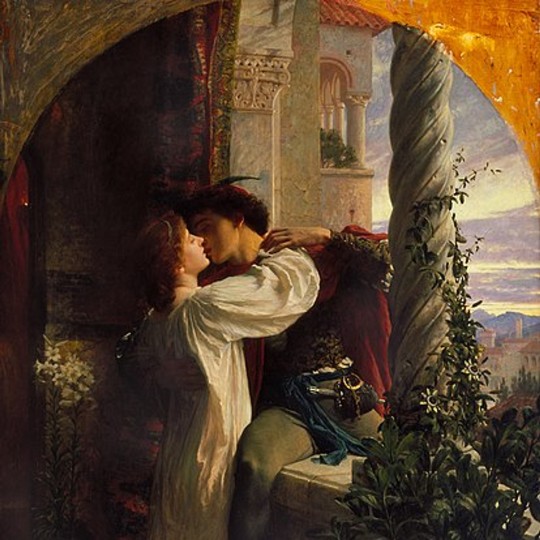
Romeo and Juliet
Romeo and Juliet is a romantic tragedy written by William Shakespeare. First printed in 1597, it remains one of the most famous works of Western literature and – alongside Hamlet – is one of Shakespeare's most oft-performed plays. The play deals with themes of young love, family, intergenerational conflict, and fate and follows the doomed romance of two star-crossed lovers.
Sources & Style
As writer Marchette Chute eloquently puts it, "Romeo and Juliet is the first of Shakespeare's great tragedies and the loveliest. It is golden with the light of morning and heavy with the death of all bright things, and the names Romeo and Juliet have passed into the language as a symbol of youth and love" (133). The play, probably written sometime between 1591 and 1595, was first published in a quarto in 1597, though the elements within the story are much older. Some of the earliest inspirations for the plot come from antiquity: the tale of Pyramus and Thisbe, as depicted in Ovid's Metamorphoses, deals with two young lovers who begin a forbidden romance and tragically end their own lives after a series of misunderstandings (this story is explicitly referenced by Shakespeare in A Midsummer Night's Dream). The Greek novel Ephesiaca, written by Xenophon of Ephesus around the 2nd century CE, also parallels Romeo and Juliet in that it includes a potion that causes a deathlike slumber.
The first true iteration of the story, does not appear until the 1530s, when a novella by Italian writer Luigi da Porto was posthumously published as Giulietta e Romeo. This was not only the first reference to the characters of Romeo and Juliet (or Giulietta), but also to their rival families, who are introduced as the 'Montecchi' and the 'Cappelletti' (interestingly, a reference to the Montecchi and Cappelletti as two feuding Italian families can be found in the sixth canto of Dante Alighieri's Purgatorio, c. 1321). Da Porto's work was used by Matteo Bandello as the source for his own 1554 Novelle, in which the story was lengthened, and the character of Benvolio was introduced. Bandello's work was translated into French, and it was this translation that inspired Arthur Brooke to write his dramatic poem The Tragical History of Romeus and Juliet (1562).
This brings us to Shakespeare, who probably used Brooke's poem as his main source. Shakespeare expanded on the source material by fleshing out characters like Mercutio and Juliet's Nurse, diminishing the immorality of Friar Laurence and minimizing the poem's antipapal tone, and shortening the time span of the story from nine months to a mere five days. It is unknown when the play was first performed, although it was certainly by the Lord Chamberlain's Men, the acting company with whom Shakespeare wrote. The first actor to play Romeo was Richard Burbage, the company's leading tragedian, while the part of Juliet was first played by Robert Goffe, a boy (women were not permitted to perform publicly in Elizabethan theatre). The play was immensely popular in Shakespeare's own lifetime, as indicated by the First Quarto in which it was printed, which states: "it hath been often (and with great applause) played publicly".
The first half of Romeo and Juliet is stylistically more in line with a romantic comedy than a tragedy. Samson and Gregory, the servant characters who appear in the first scene, are depicted as "slapstick cowards"; the Nurse and Mercutio provide humorous, witty, and often bawdy pieces of dialogue; and the lovers, too, are "well suited to Shakespearean comedy", with Romeo introduced as a melancholic teenager pining for Rosaline's affections, only to be taught the true nature of love by the younger Juliet (Bevington, 445). Yet, abruptly, the tone of the play shifts in the first scene of Act III, when Mercutio is slain by Tybalt, who, in turn, is killed by Romeo. Romeo faces banishment, Juliet faces the prospect of an unwanted marriage, and both young lovers end up committing suicide after believing the other to be dead. It is a series of accidents and misunderstandings, underscored by the hatred between the Montagues and Capulets, that brings about the tragedy in this play, which otherwise celebrates "the exquisite, brief joy of youthful passion" (Bevington, 444). Only with the deaths of their children can Montague and Capulet set aside their differences and clasp hands.
Romeo Fights Tybalt
Prince Albert of Saxe-Coburg and Gotha (Public Domain)
Continue reading...
13 notes
·
View notes